Education in Communist China
VerifiedAdded on 2023/04/10
|23
|5116
|320
AI Summary
This book provides an in-depth analysis of the educational system in Communist China, focusing on the challenges faced in implementing new policies. It explores the Cultural Revolution and its impact on education, as well as the obstacles hindering reform. The book also discusses the role of traditional ideologies, language barriers, and the influence of the family structure. Written by R.F. Price, this book offers valuable insights into the complexities of education in Communist China.
Contribute Materials
Your contribution can guide someone’s learning journey. Share your
documents today.
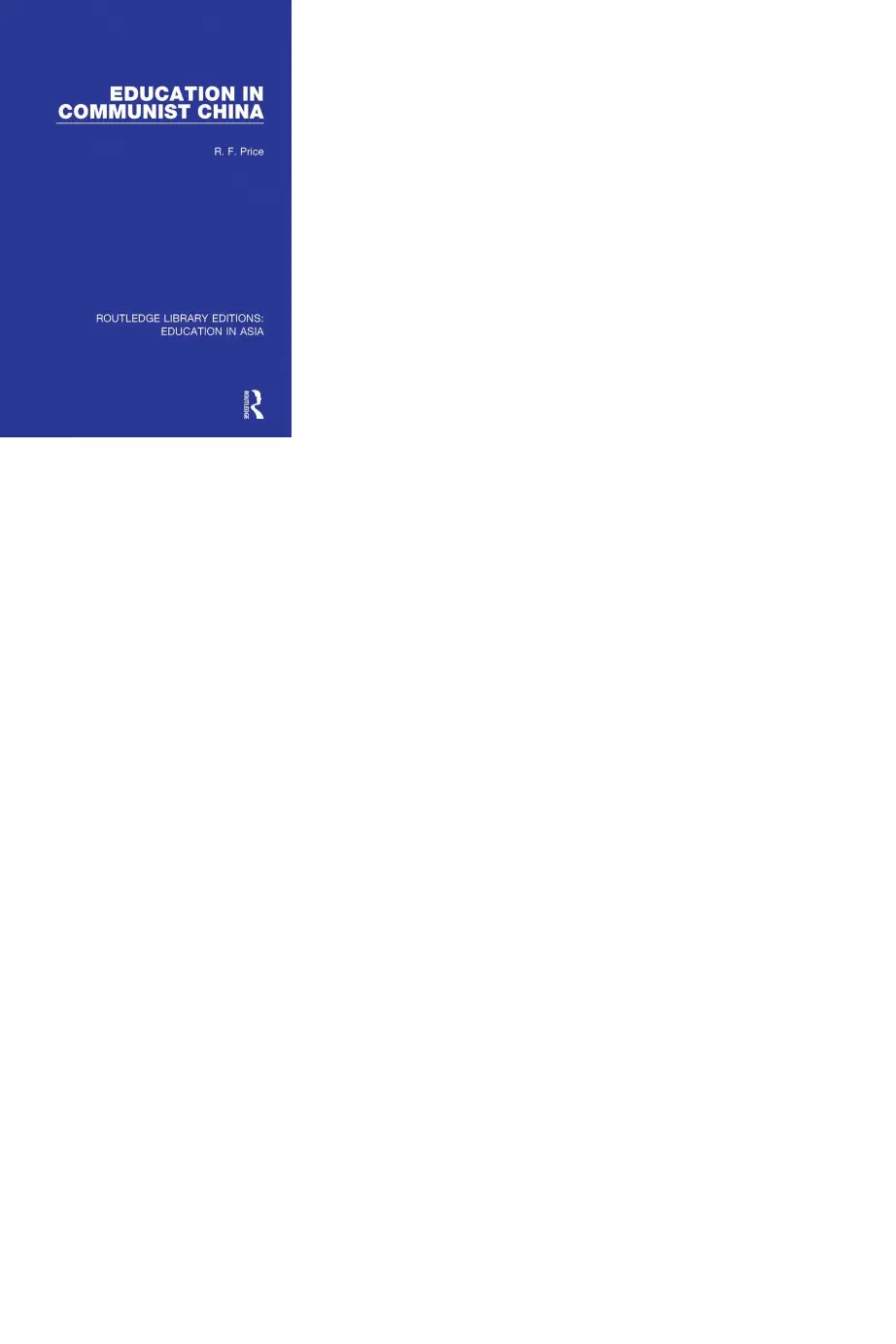
Secure Best Marks with AI Grader
Need help grading? Try our AI Grader for instant feedback on your assignments.
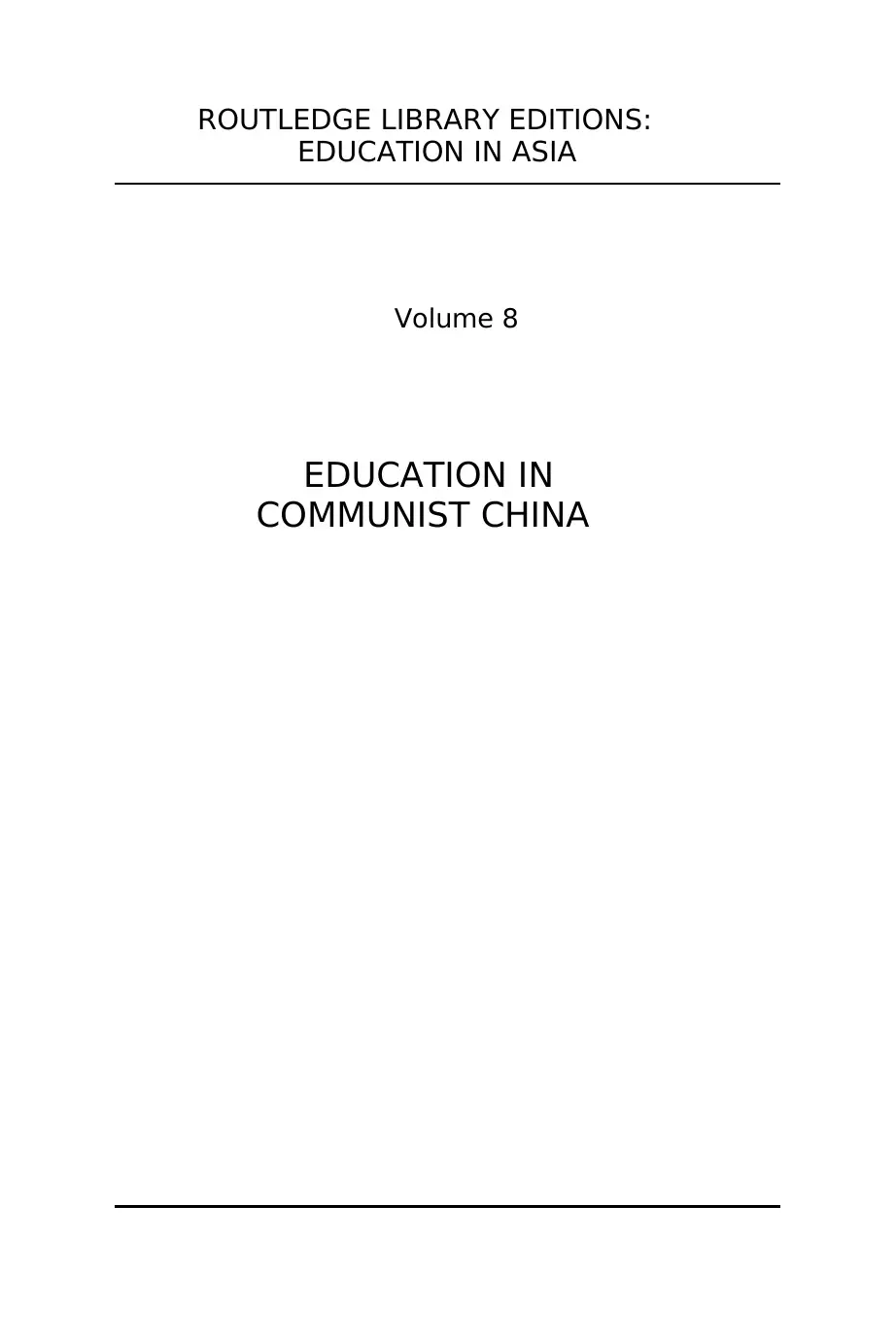
ROUTLEDGE LIBRARY EDITIONS:
EDUCATION IN ASIA
Volume 8
EDUCATION IN
COMMUNIST CHINA
EDUCATION IN ASIA
Volume 8
EDUCATION IN
COMMUNIST CHINA

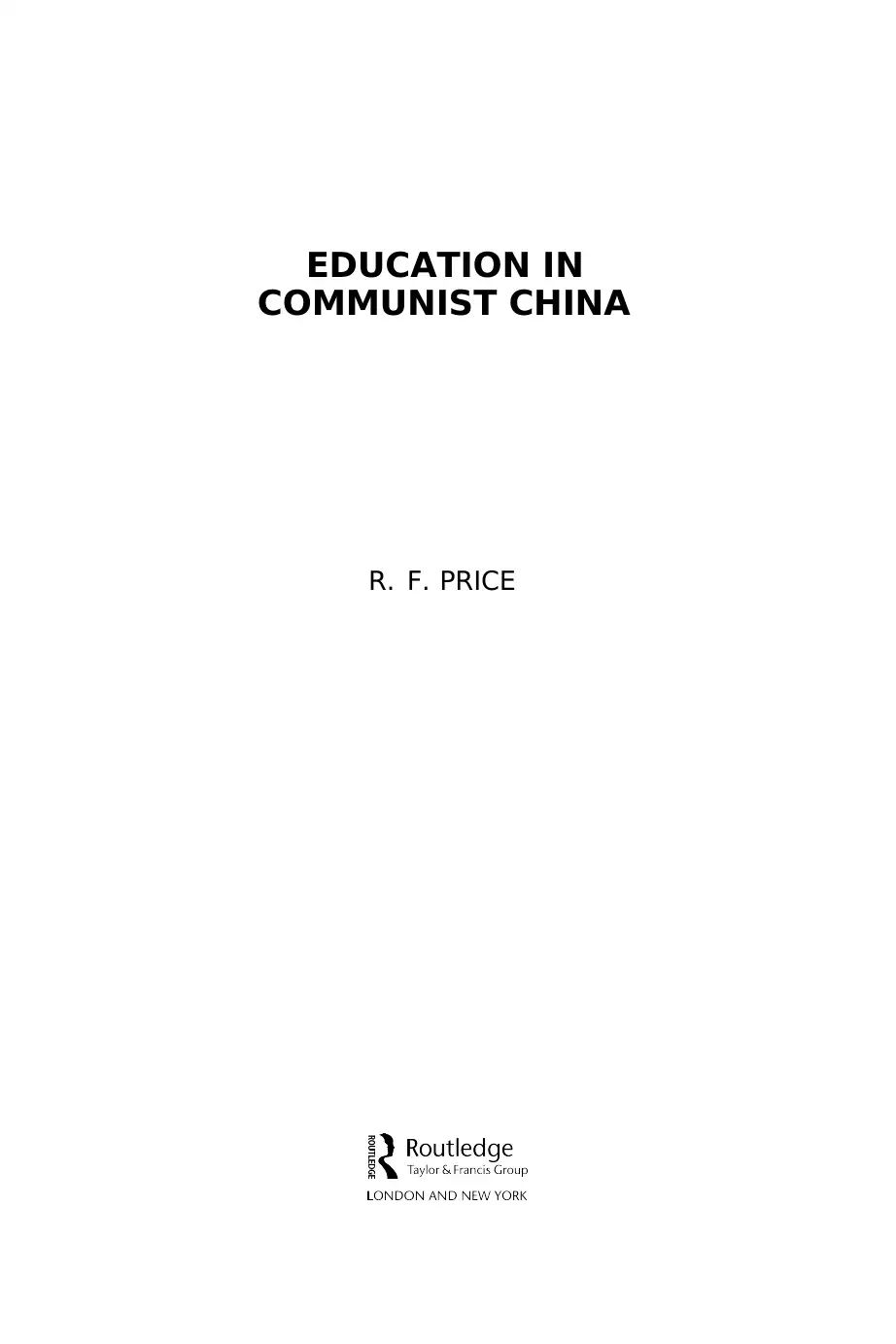
EDUCATION IN
COMMUNIST CHINA
R. F. PRICE
COMMUNIST CHINA
R. F. PRICE
Secure Best Marks with AI Grader
Need help grading? Try our AI Grader for instant feedback on your assignments.
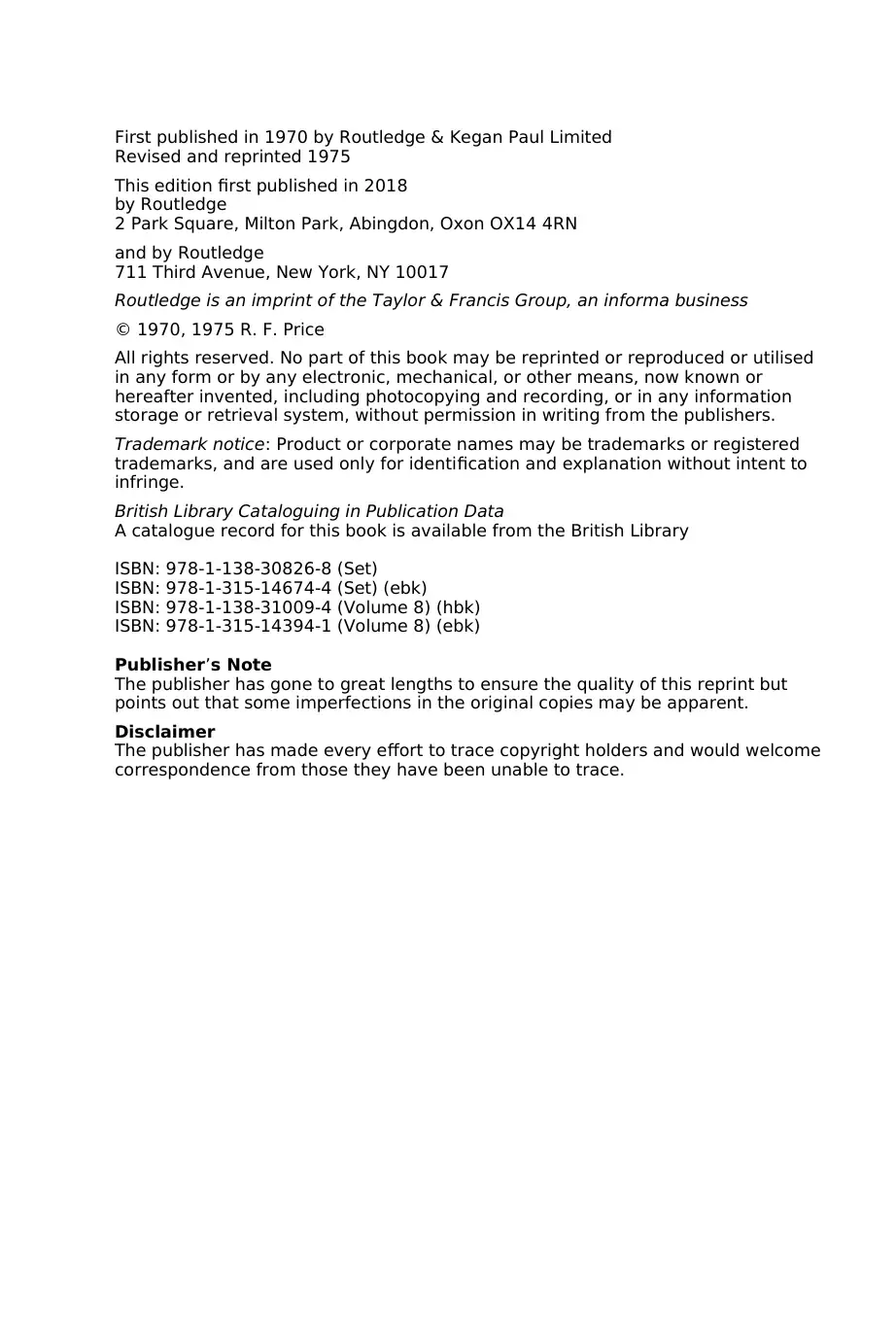
First published in 1970 by Routledge & Kegan Paul Limited
Revised and reprinted 1975
This edition first published in 2018
by Routledge
2 Park Square, Milton Park, Abingdon, Oxon OX14 4RN
and by Routledge
711 Third Avenue, New York, NY 10017
Routledge is an imprint of the Taylor & Francis Group, an informa business
© 1970, 1975 R. F. Price
All rights reserved. No part of this book may be reprinted or reproduced or utilised
in any form or by any electronic, mechanical, or other means, now known or
hereafter invented, including photocopying and recording, or in any information
storage or retrieval system, without permission in writing from the publishers.
Trademark notice: Product or corporate names may be trademarks or registered
trademarks, and are used only for identification and explanation without intent to
infringe.
British Library Cataloguing in Publication Data
A catalogue record for this book is available from the British Library
ISBN: 978-1-138-30826-8 (Set)
ISBN: 978-1-315-14674-4 (Set) (ebk)
ISBN: 978-1-138-31009-4 (Volume 8) (hbk)
ISBN: 978-1-315-14394-1 (Volume 8) (ebk)
Publisher’s Note
The publisher has gone to great lengths to ensure the quality of this reprint but
points out that some imperfections in the original copies may be apparent.
Disclaimer
The publisher has made every effort to trace copyright holders and would welcome
correspondence from those they have been unable to trace.
Revised and reprinted 1975
This edition first published in 2018
by Routledge
2 Park Square, Milton Park, Abingdon, Oxon OX14 4RN
and by Routledge
711 Third Avenue, New York, NY 10017
Routledge is an imprint of the Taylor & Francis Group, an informa business
© 1970, 1975 R. F. Price
All rights reserved. No part of this book may be reprinted or reproduced or utilised
in any form or by any electronic, mechanical, or other means, now known or
hereafter invented, including photocopying and recording, or in any information
storage or retrieval system, without permission in writing from the publishers.
Trademark notice: Product or corporate names may be trademarks or registered
trademarks, and are used only for identification and explanation without intent to
infringe.
British Library Cataloguing in Publication Data
A catalogue record for this book is available from the British Library
ISBN: 978-1-138-30826-8 (Set)
ISBN: 978-1-315-14674-4 (Set) (ebk)
ISBN: 978-1-138-31009-4 (Volume 8) (hbk)
ISBN: 978-1-315-14394-1 (Volume 8) (ebk)
Publisher’s Note
The publisher has gone to great lengths to ensure the quality of this reprint but
points out that some imperfections in the original copies may be apparent.
Disclaimer
The publisher has made every effort to trace copyright holders and would welcome
correspondence from those they have been unable to trace.
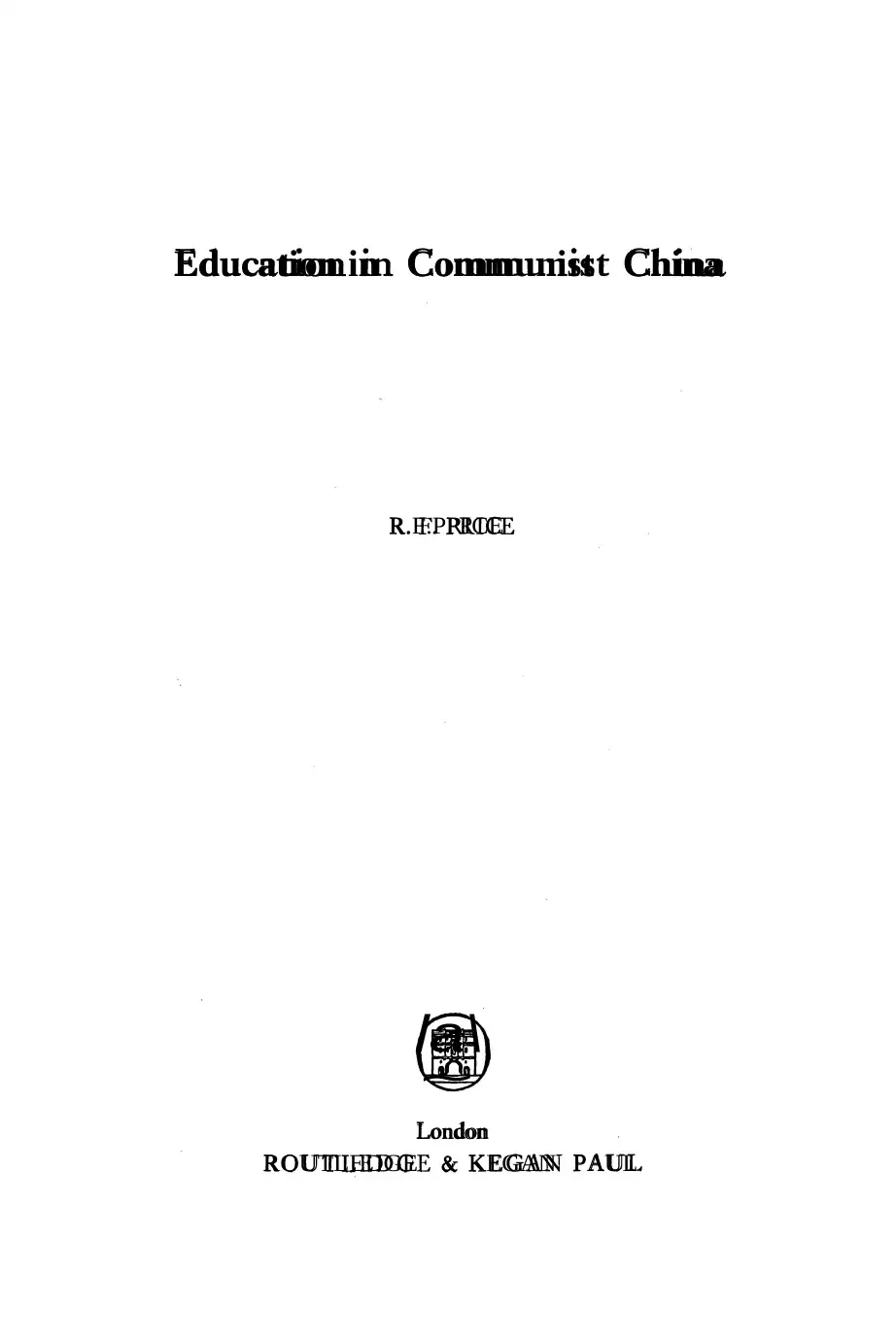
Education in Communist China
R.F.PRICE
la\
~
London
ROUTLEDGE & KEGAN PAUL
R.F.PRICE
la\
~
London
ROUTLEDGE & KEGAN PAUL
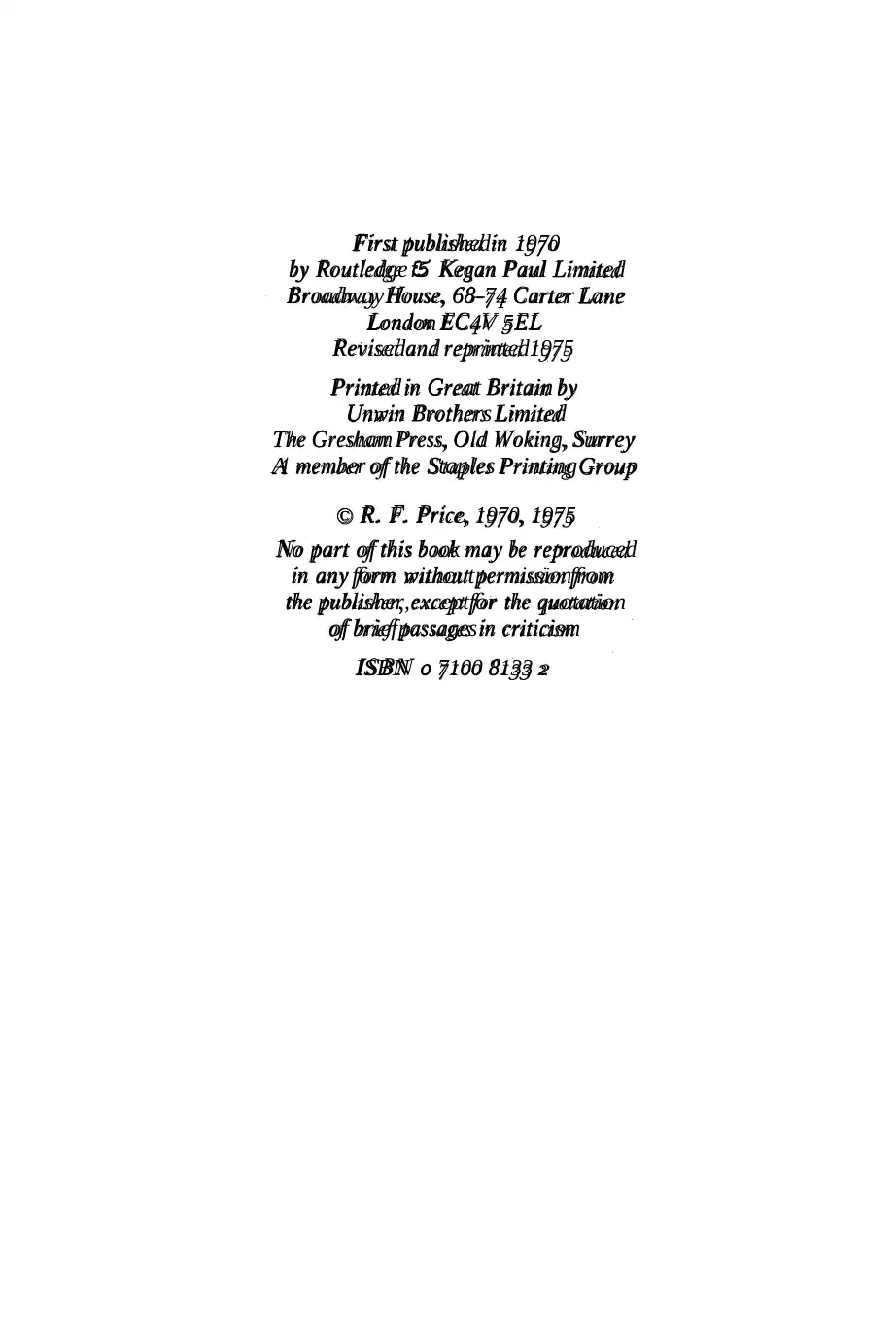
First published in 1970
by Routledge f5 Kegan Paul Limited
Broadway House, 68-74 Carter Lane
London EC4V 5EL
Revisedand reprinted 1975
Printed in Great Britain by
Unwin Brothers Limited
The Gresham Press, Old Woking, Surrey
A member of the Staples Printing Group
© R. F. Price, 1970, 1975
No part of this book may be reproduced
in any form without permissionfrom
the publisher, exceptfor the quotation
of brief passages in criticism
ISBN o 7100 8133 2
by Routledge f5 Kegan Paul Limited
Broadway House, 68-74 Carter Lane
London EC4V 5EL
Revisedand reprinted 1975
Printed in Great Britain by
Unwin Brothers Limited
The Gresham Press, Old Woking, Surrey
A member of the Staples Printing Group
© R. F. Price, 1970, 1975
No part of this book may be reproduced
in any form without permissionfrom
the publisher, exceptfor the quotation
of brief passages in criticism
ISBN o 7100 8133 2
Paraphrase This Document
Need a fresh take? Get an instant paraphrase of this document with our AI Paraphraser
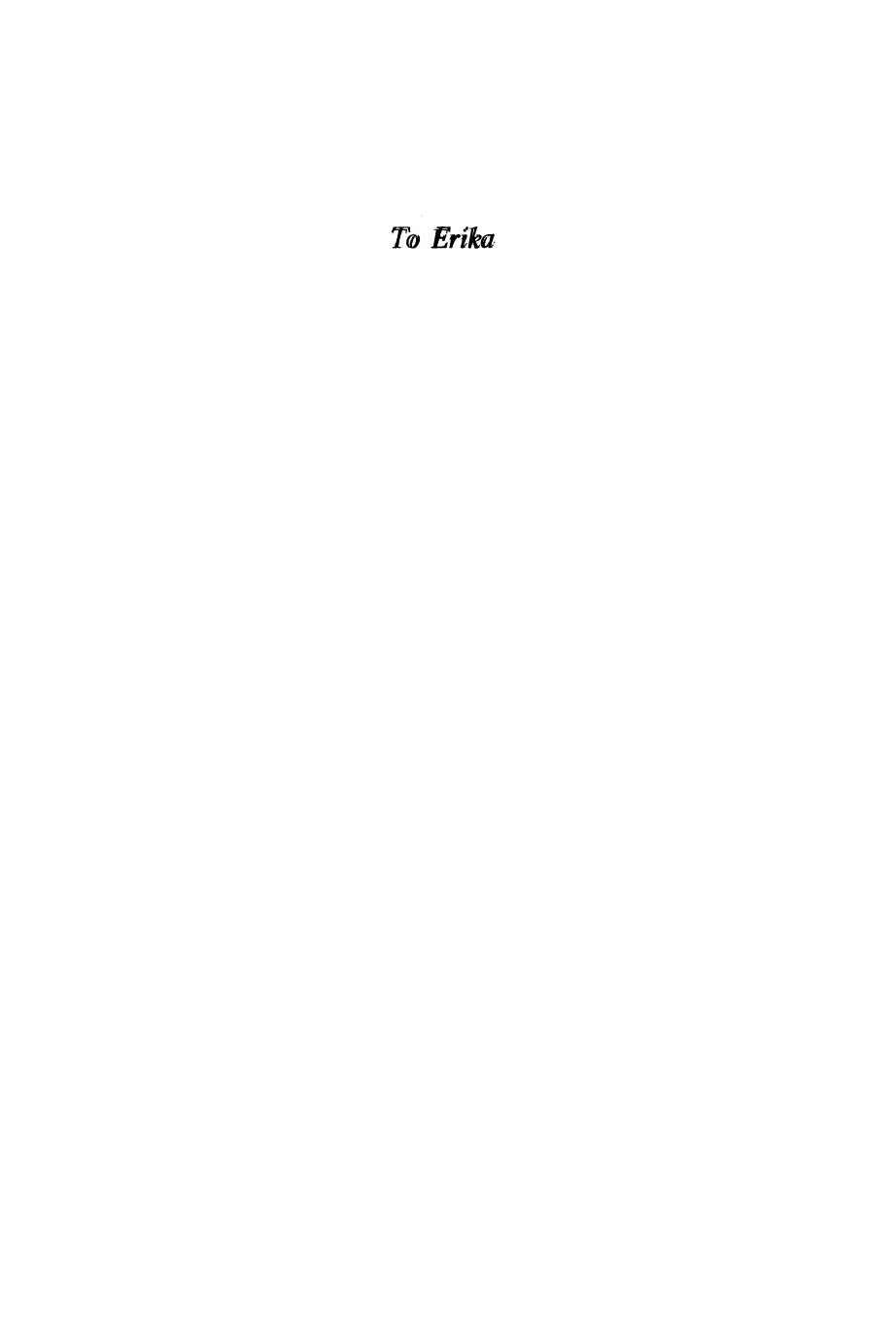
To Erika

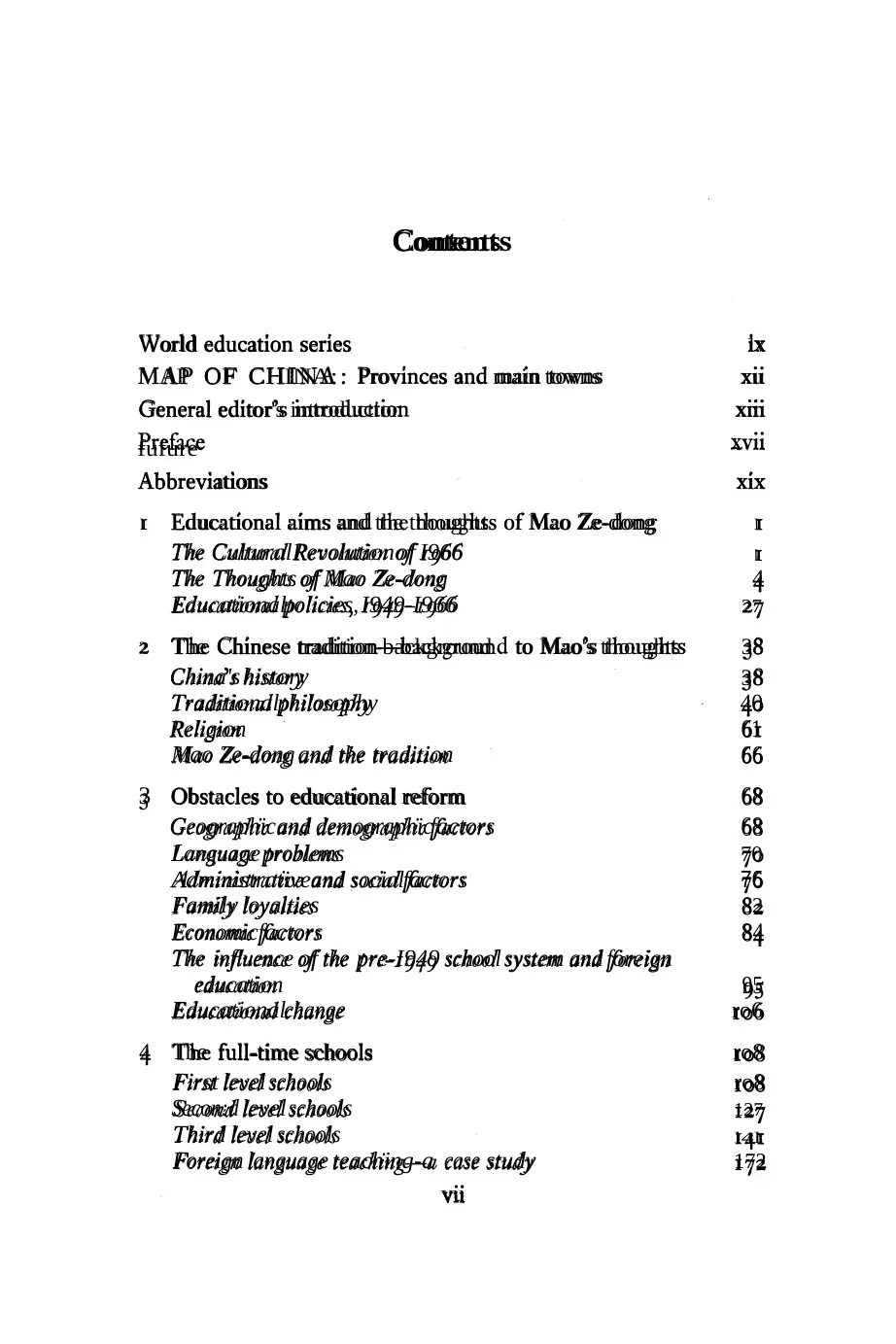
Contents
World education series 1x
MAP OF CHINA: Provinces and main towns xu
General editor's introduction xm
fufure ~·
Abbreviations xix
l Educational aims and the thoughts of Mao Ze-dong l
The Cultural Revolution of I966 l
The Thoughts of Mao Ze-dong 4
Educationalpolicies, I949-I966 27
2 The Chinese tradition-background to Mao's thoughts 38
China's history 38
Traditionalphilosophy 40
Religion 61
Mao Ze-dong and the tradition 66
3 Obstacles to educational reform 68
Geographic and demographicfactors 68
Language problems 70
Administrativeand socialfactors 76
Family loyalties 82
Economicfactors 84
The influence of the pre-I949 school system and foreign
education 95
Educationalchange ro6
4 The full-time schools ro8
First level schools ro8
Secon:d level schools 127
Third level schools l4l
Foreign language teaching-a case study 172
vu
World education series 1x
MAP OF CHINA: Provinces and main towns xu
General editor's introduction xm
fufure ~·
Abbreviations xix
l Educational aims and the thoughts of Mao Ze-dong l
The Cultural Revolution of I966 l
The Thoughts of Mao Ze-dong 4
Educationalpolicies, I949-I966 27
2 The Chinese tradition-background to Mao's thoughts 38
China's history 38
Traditionalphilosophy 40
Religion 61
Mao Ze-dong and the tradition 66
3 Obstacles to educational reform 68
Geographic and demographicfactors 68
Language problems 70
Administrativeand socialfactors 76
Family loyalties 82
Economicfactors 84
The influence of the pre-I949 school system and foreign
education 95
Educationalchange ro6
4 The full-time schools ro8
First level schools ro8
Secon:d level schools 127
Third level schools l4l
Foreign language teaching-a case study 172
vu
Secure Best Marks with AI Grader
Need help grading? Try our AI Grader for instant feedback on your assignments.
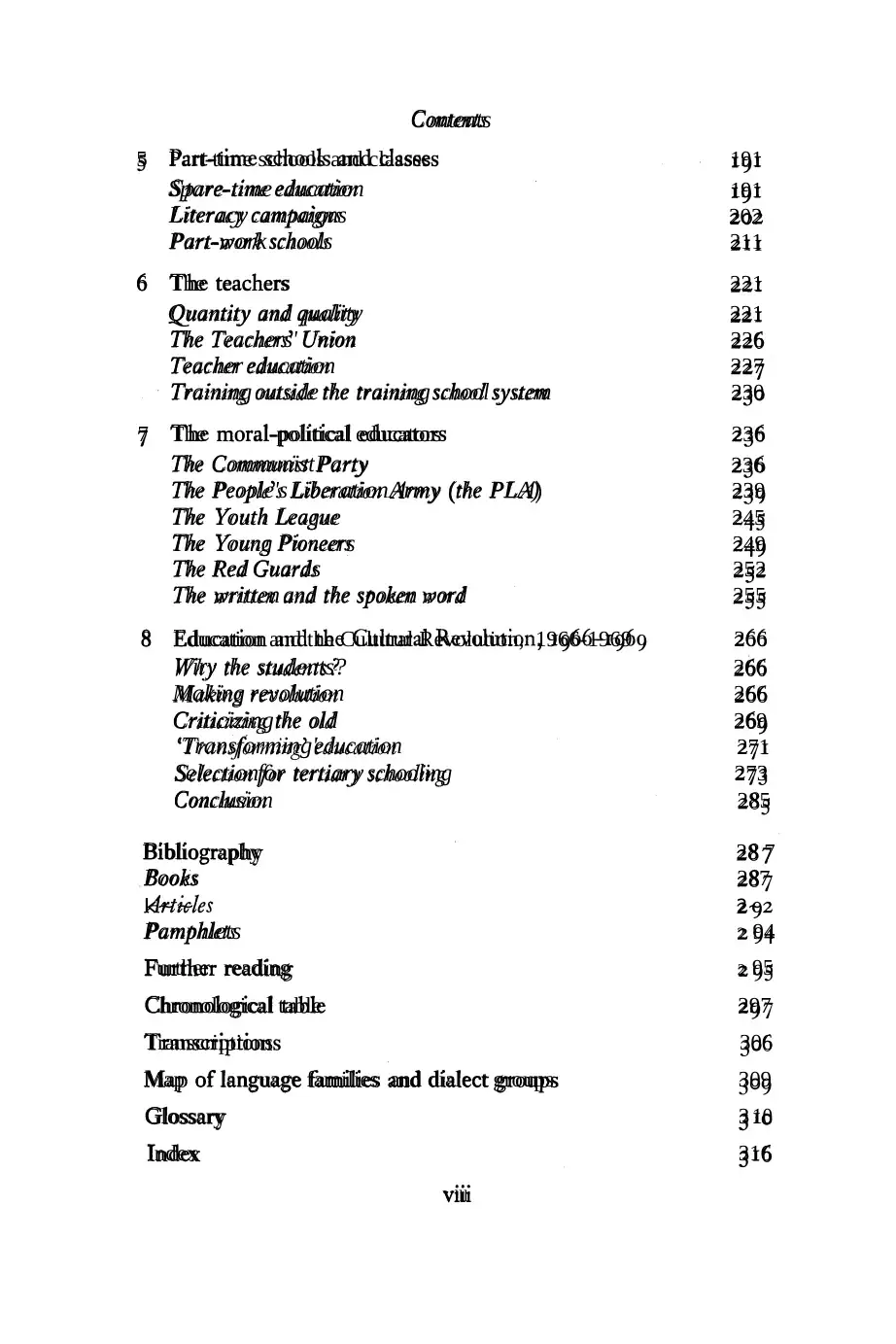
Contents
5 Part-time schools and classes 191
Spare-time education 191
Literacy campaigns 202
Part-work schools 211
6 The teachers 221
Quantity and quality 221
The Teachers' Union 226
Teacher education 227
Training outside the training school system 230
7 The moral-political educators 236
The Communist Party 236
The People's Liberation Army (the PLA) 239
The Youth League 245
The Young Pioneers 249
The Red Guards 252
The written and the spoken word 255
8 Education and the Cultural Revolution, 1966-1969 266
Wiry the students? 266
Making revolution 266
Criticizing the old 269
'Transforming'education 271
Selectionfor tertiary schooling 273
Conclusion 285
Bibliography 28 7
Books 287
k~~ 2~
Pamphlets 2 94
Further reading 2 95
Chronological table 297
Transcriptions 306
Map of language families and dialect groups 309
Glossary 3 10
Index 316
Vlll
5 Part-time schools and classes 191
Spare-time education 191
Literacy campaigns 202
Part-work schools 211
6 The teachers 221
Quantity and quality 221
The Teachers' Union 226
Teacher education 227
Training outside the training school system 230
7 The moral-political educators 236
The Communist Party 236
The People's Liberation Army (the PLA) 239
The Youth League 245
The Young Pioneers 249
The Red Guards 252
The written and the spoken word 255
8 Education and the Cultural Revolution, 1966-1969 266
Wiry the students? 266
Making revolution 266
Criticizing the old 269
'Transforming'education 271
Selectionfor tertiary schooling 273
Conclusion 285
Bibliography 28 7
Books 287
k~~ 2~
Pamphlets 2 94
Further reading 2 95
Chronological table 297
Transcriptions 306
Map of language families and dialect groups 309
Glossary 3 10
Index 316
Vlll
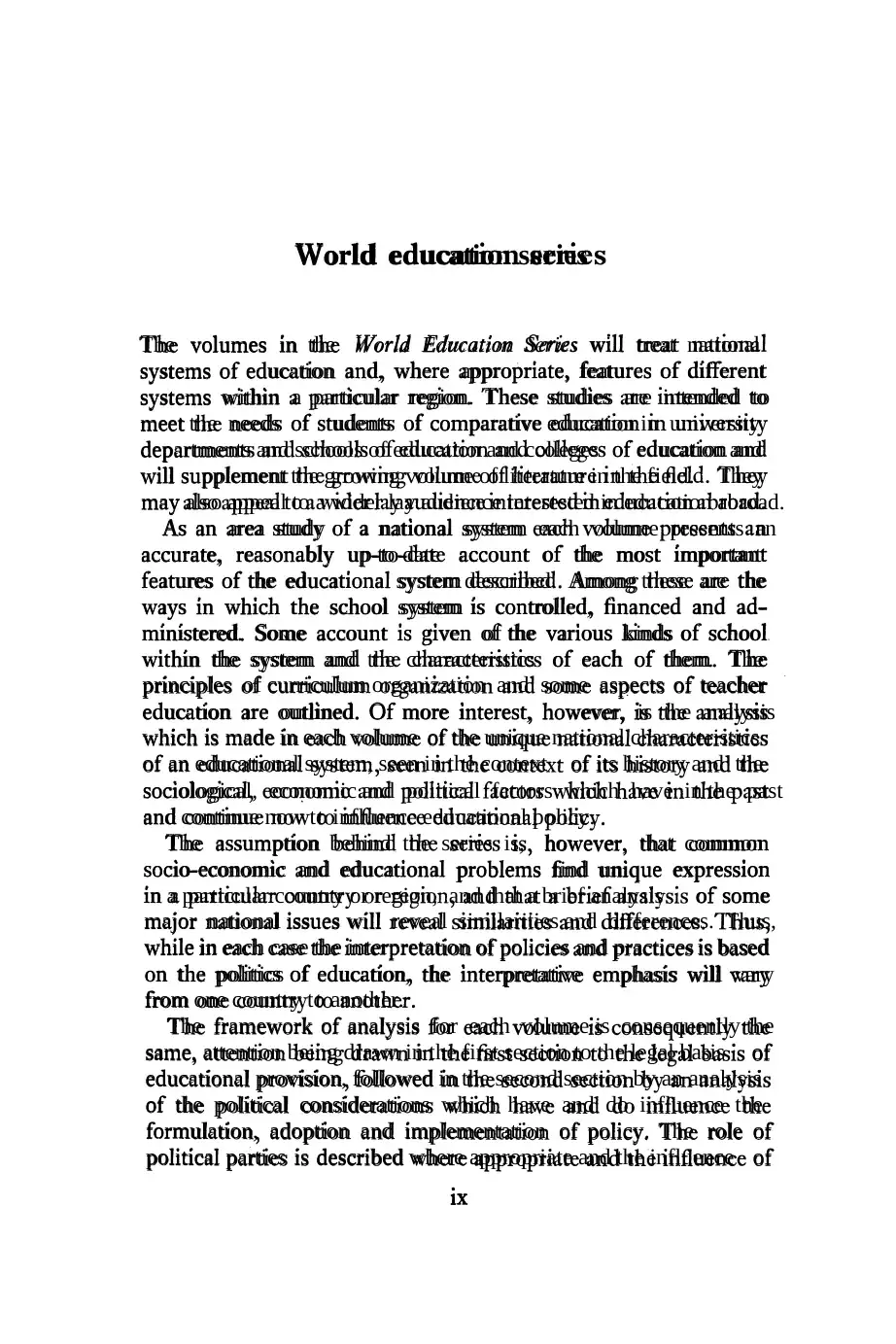
World education series
The volumes in the World Education Series will treat national
systems of education and, where appropriate, features of different
systems within a particular region. These studies are intended to
meet the needs of students of comparative education in university
departments and schools of education and colleges of education and
will supplement the growing volume of literature in the field. They
may also appeal to a wider lay audience interested in education abroad.
As an area study of a national system each volume presents an
accurate, reasonably up-to-date account of the most important
features of the educational system described. Among these are the
ways in which the school system is controlled, financed and ad-
ministered. Some account is given of the various kinds of school
within the system and the characteristics of each of them. The
principles of curriculum organization and some aspects of teacher
education are outlined. Of more interest, however, is the analysis
which is made in each volume of the unique national characteristics
of an educational system, seen in the context of its history and the
sociological, economic and political factors which have in the past
and continue now to influence educational policy.
The assumption behind the series is, however, that common
socio-economic and educational problems find unique expression
in a particular country or region, and that a brief analysis of some
major national issues will reveal similarities and differences. Thus,
while in each case the interpretation of policies and practices is based
on the politics of education, the interpretative emphasis will vary
from one country to another.
The framework of analysis for each volume is consequently the
same, attention being drawn in the first section to the legal basis of
educational provision, followed in the second section by an analysis
of the political considerations which have and do influence the
formulation, adoption and implementation of policy. The role of
political parties is described where appropriate and the influence of
1X
The volumes in the World Education Series will treat national
systems of education and, where appropriate, features of different
systems within a particular region. These studies are intended to
meet the needs of students of comparative education in university
departments and schools of education and colleges of education and
will supplement the growing volume of literature in the field. They
may also appeal to a wider lay audience interested in education abroad.
As an area study of a national system each volume presents an
accurate, reasonably up-to-date account of the most important
features of the educational system described. Among these are the
ways in which the school system is controlled, financed and ad-
ministered. Some account is given of the various kinds of school
within the system and the characteristics of each of them. The
principles of curriculum organization and some aspects of teacher
education are outlined. Of more interest, however, is the analysis
which is made in each volume of the unique national characteristics
of an educational system, seen in the context of its history and the
sociological, economic and political factors which have in the past
and continue now to influence educational policy.
The assumption behind the series is, however, that common
socio-economic and educational problems find unique expression
in a particular country or region, and that a brief analysis of some
major national issues will reveal similarities and differences. Thus,
while in each case the interpretation of policies and practices is based
on the politics of education, the interpretative emphasis will vary
from one country to another.
The framework of analysis for each volume is consequently the
same, attention being drawn in the first section to the legal basis of
educational provision, followed in the second section by an analysis
of the political considerations which have and do influence the
formulation, adoption and implementation of policy. The role of
political parties is described where appropriate and the influence of
1X
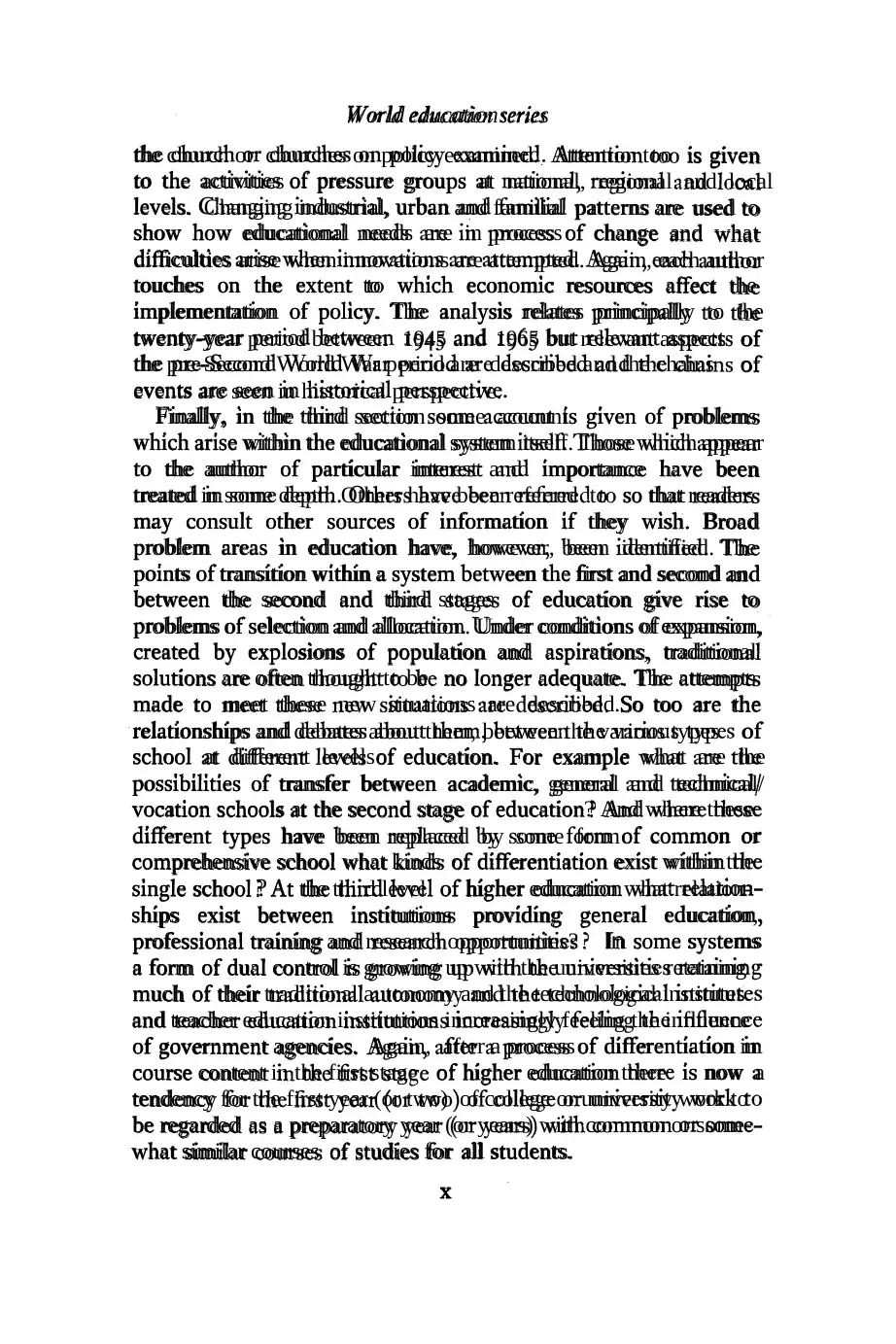
World education series
the church or churches on policy examined. Attention too is given
to the activities of pressure groups at national, regional and local
levels. Changing industrial, urban and familial patterns are used to
show how educational needs are in process of change and what
difficulties arise when innovations are attempted. Again, each author
touches on the extent to which economic resources affect the
implementation of policy. The analysis relates principally to the
twenty-year period between 1945 and 1965 but relevant aspects of
the pre-Second World War period are described and the chains of
events are seen in historical perspective.
Finally, in the third section some accountis given of problems
which arise within the educational system itself. Those which appear
to the author of particular interest and importance have been
treated in some depth. Others have been referred to so that readers
may consult other sources of information if they wish. Broad
problem areas in education have, however, been identified. The
points of transition within a system between the first and second and
between the second and third stages of education give rise to
problems of selection and allocation. Under conditions of expansion,
created by explosions of population and aspirations, traditional
solutions are often thought to be no longer adequate. The attempts
made to meet these new situations are described.So too are the
relationships and debates about them, between the various types of
school at different levels of education. For example what are the
possibilities of transfer between academic, general and technical/
vocation schools at the second stage of education? And where these
different types have been replaced by some form of common or
comprehensive school what kinds of differentiation exist within the
single school ? At the third level of higher education what relation-
ships exist between institutions providing general education,
professional training and research opportunities? In some systems
a form of dual control is growing up with the universities retaining
much of their traditional autonomy and the technological institutes
and teacher education institutions increasingly feeling the influence
of government agencies. Again, after a process of differentiation in
course content in the first stage of higher education there is now a
tendency for the first year (or two) of college or university work to
be regarded as a preparatory year (or years) with common or some-
what similar courses of studies for all students.
x
the church or churches on policy examined. Attention too is given
to the activities of pressure groups at national, regional and local
levels. Changing industrial, urban and familial patterns are used to
show how educational needs are in process of change and what
difficulties arise when innovations are attempted. Again, each author
touches on the extent to which economic resources affect the
implementation of policy. The analysis relates principally to the
twenty-year period between 1945 and 1965 but relevant aspects of
the pre-Second World War period are described and the chains of
events are seen in historical perspective.
Finally, in the third section some accountis given of problems
which arise within the educational system itself. Those which appear
to the author of particular interest and importance have been
treated in some depth. Others have been referred to so that readers
may consult other sources of information if they wish. Broad
problem areas in education have, however, been identified. The
points of transition within a system between the first and second and
between the second and third stages of education give rise to
problems of selection and allocation. Under conditions of expansion,
created by explosions of population and aspirations, traditional
solutions are often thought to be no longer adequate. The attempts
made to meet these new situations are described.So too are the
relationships and debates about them, between the various types of
school at different levels of education. For example what are the
possibilities of transfer between academic, general and technical/
vocation schools at the second stage of education? And where these
different types have been replaced by some form of common or
comprehensive school what kinds of differentiation exist within the
single school ? At the third level of higher education what relation-
ships exist between institutions providing general education,
professional training and research opportunities? In some systems
a form of dual control is growing up with the universities retaining
much of their traditional autonomy and the technological institutes
and teacher education institutions increasingly feeling the influence
of government agencies. Again, after a process of differentiation in
course content in the first stage of higher education there is now a
tendency for the first year (or two) of college or university work to
be regarded as a preparatory year (or years) with common or some-
what similar courses of studies for all students.
x
Paraphrase This Document
Need a fresh take? Get an instant paraphrase of this document with our AI Paraphraser
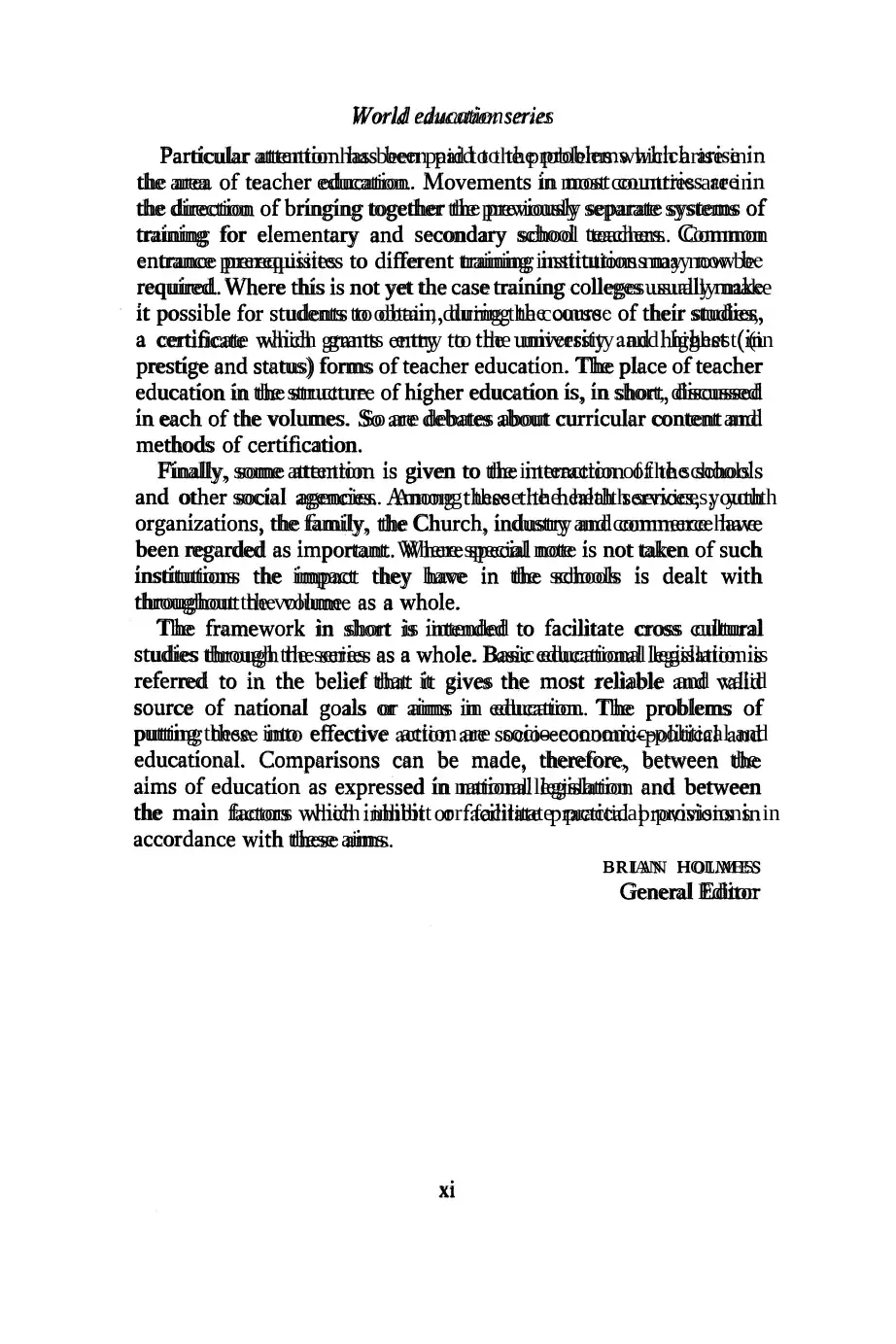
World education series
Particular attention has been paid to the problems which arise in
the area of teacher education. Movements in most countries are in
the direction of bringing together the previously separate systems of
training for elementary and secondary school teachers. Common
entrance prerequisites to different training institutions may now be
required. Where this is not yet the case training colleges usually make
it possible for students to obtain, during the course of their studies,
a certificate which grants entry to the university and highest (in
prestige and status) forms of teacher education. The place of teacher
education in the structure of higher education is, in short, discussed
in each of the volumes. So are debates about curricular content and
methods of certification.
Finally, some attention is given to the interaction of the schools
and other social agencies. Among these the health services, youth
organizations, the family, the Church, industry and commerce have
been regarded as important. Where special note is not taken of such
institutions the impact they have in the schools is dealt with
throughout the volume as a whole.
The framework in short is intended to facilitate cross cultural
studies through the series as a whole. Basic educational legislation is
referred to in the belief that it gives the most reliable and valid
source of national goals or aims in education. The problems of
putting these into effective action are socio-economic-political and
educational. Comparisons can be made, therefore, between the
aims of education as expressed in national legislation and between
the main factors which inhibit or facilitate practical provisions in
accordance with these aims.
XI
BRIAN HOLMES
General Editor
Particular attention has been paid to the problems which arise in
the area of teacher education. Movements in most countries are in
the direction of bringing together the previously separate systems of
training for elementary and secondary school teachers. Common
entrance prerequisites to different training institutions may now be
required. Where this is not yet the case training colleges usually make
it possible for students to obtain, during the course of their studies,
a certificate which grants entry to the university and highest (in
prestige and status) forms of teacher education. The place of teacher
education in the structure of higher education is, in short, discussed
in each of the volumes. So are debates about curricular content and
methods of certification.
Finally, some attention is given to the interaction of the schools
and other social agencies. Among these the health services, youth
organizations, the family, the Church, industry and commerce have
been regarded as important. Where special note is not taken of such
institutions the impact they have in the schools is dealt with
throughout the volume as a whole.
The framework in short is intended to facilitate cross cultural
studies through the series as a whole. Basic educational legislation is
referred to in the belief that it gives the most reliable and valid
source of national goals or aims in education. The problems of
putting these into effective action are socio-economic-political and
educational. Comparisons can be made, therefore, between the
aims of education as expressed in national legislation and between
the main factors which inhibit or facilitate practical provisions in
accordance with these aims.
XI
BRIAN HOLMES
General Editor
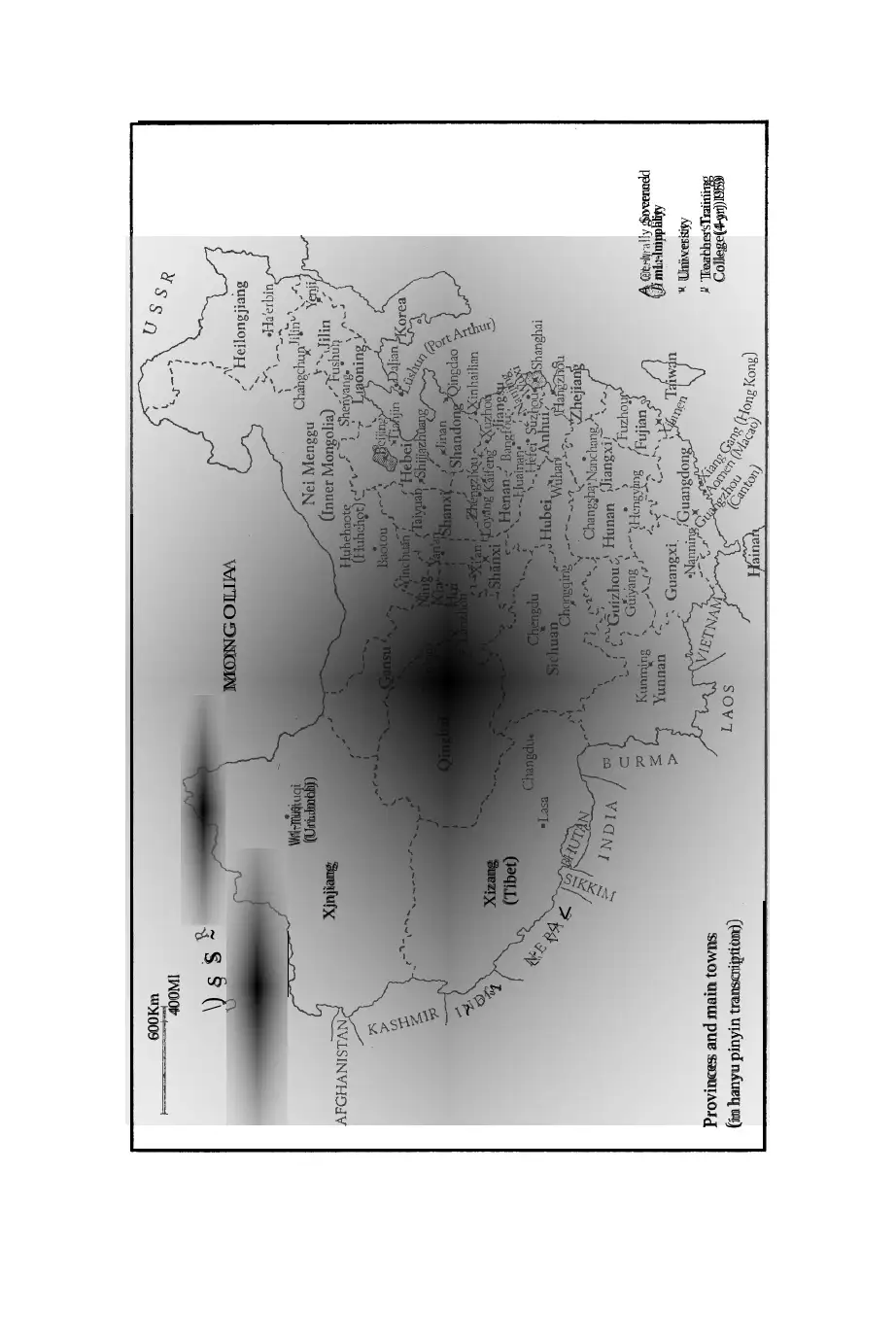
600Km
400Ml
\) s s ~
Xjnjiang
~
<>.,..,
"1
<!;~ I><1
<
Provinces and main towns
(in hanyu pinyin transcription)
Xizang
(Tibet)
Wnl~muqi
(Uri.Jmchi)
MONGOLIA
A Cent;.~lly .$overned
\Ji m1:-lmupality
" University
" Teachers'Training
College (4-yr) 1959
400Ml
\) s s ~
Xjnjiang
~
<>.,..,
"1
<!;~ I><1
<
Provinces and main towns
(in hanyu pinyin transcription)
Xizang
(Tibet)
Wnl~muqi
(Uri.Jmchi)
MONGOLIA
A Cent;.~lly .$overned
\Ji m1:-lmupality
" University
" Teachers'Training
College (4-yr) 1959
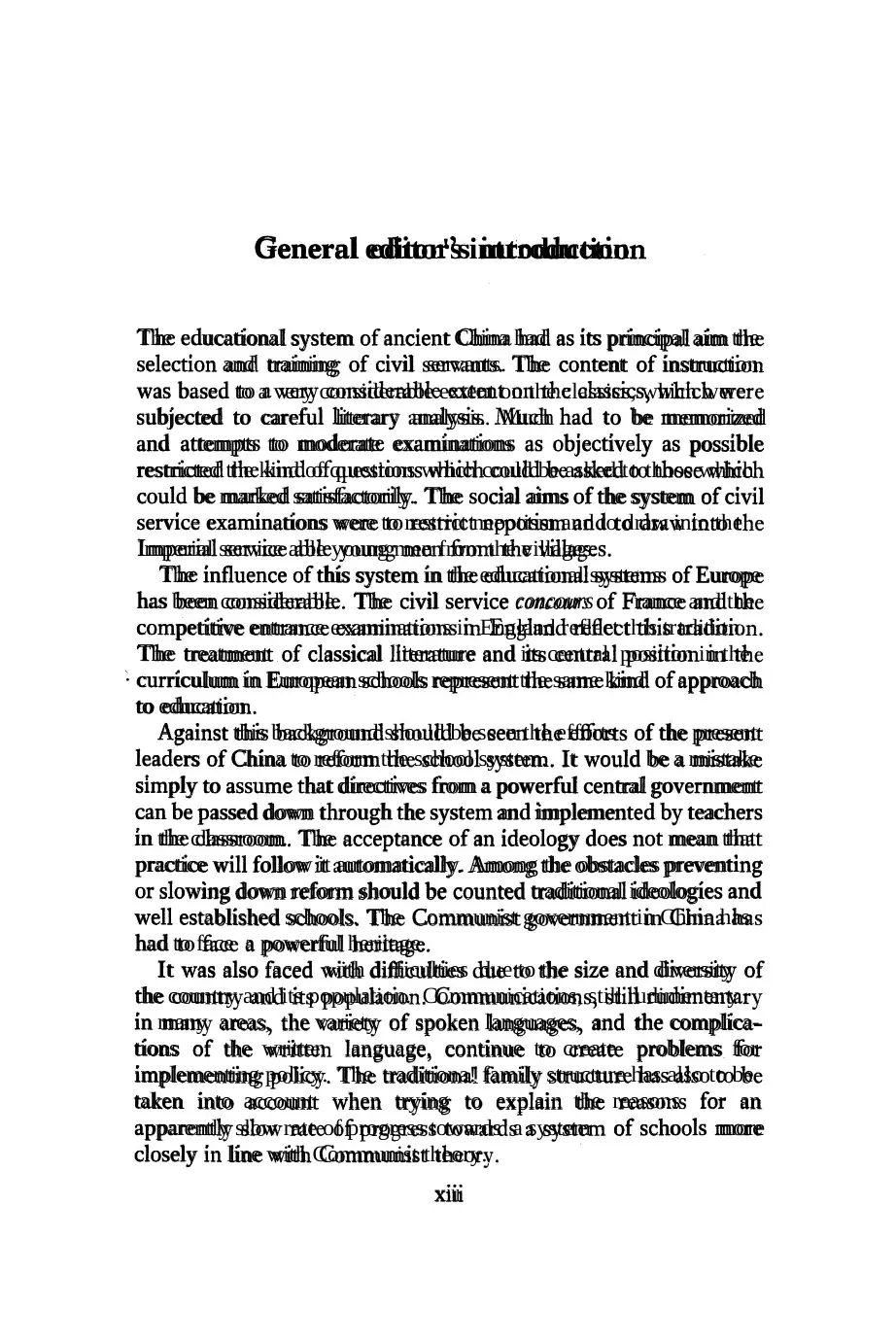
General editor's introduction
The educational system of ancient China had as its principal aim the
selection and training of civil servants. The content of instruction
was based to a very considerable extent on the classics, which were
subjected to careful literary analysis. Much had to be memorized
and attempts to moderate examinations as objectively as possible
restricted the kind of questions which could be asked to those which
could be marked satisfactorily. The social aims of the system of civil
service examinations were to restrict nepotism and to draw into the
Imperial service able young men from the villages.
The influence of this system in the educational systems of Europe
has been considerable. The civil service concours of France and the
competitive entrance examinations in England reflect this tradition.
The treatment of classical literature and its central position in the
· curriculum in European schools represent the same kind of approach
to education.
Against this background should be seen the efforts of the present
leaders of China to reform the school system. It would be a mistake
simply to assume that directives from a powerful central government
can be passed down through the system and implemented by teachers
in the classroom. The acceptance of an ideology does not mean that
practice will follow it automatically. Among the obstacles preventing
or slowing down reform should be counted traditional ideologies and
well established schools. The Communist government in China has
had to face a powerful heritage.
It was also faced with difficulties due to the size and diversity of
the country and its population. Communications, still rudimentary
in many areas, the variety of spoken languages, and the complica-
tions of the written language, continue to create problems for
implementing policy. The traditiona! family structure has also to be
taken into account when trying to explain the reasons for an
apparently slow rate of progress towards a system of schools more
closely in line with Communist theory.
Xlll
The educational system of ancient China had as its principal aim the
selection and training of civil servants. The content of instruction
was based to a very considerable extent on the classics, which were
subjected to careful literary analysis. Much had to be memorized
and attempts to moderate examinations as objectively as possible
restricted the kind of questions which could be asked to those which
could be marked satisfactorily. The social aims of the system of civil
service examinations were to restrict nepotism and to draw into the
Imperial service able young men from the villages.
The influence of this system in the educational systems of Europe
has been considerable. The civil service concours of France and the
competitive entrance examinations in England reflect this tradition.
The treatment of classical literature and its central position in the
· curriculum in European schools represent the same kind of approach
to education.
Against this background should be seen the efforts of the present
leaders of China to reform the school system. It would be a mistake
simply to assume that directives from a powerful central government
can be passed down through the system and implemented by teachers
in the classroom. The acceptance of an ideology does not mean that
practice will follow it automatically. Among the obstacles preventing
or slowing down reform should be counted traditional ideologies and
well established schools. The Communist government in China has
had to face a powerful heritage.
It was also faced with difficulties due to the size and diversity of
the country and its population. Communications, still rudimentary
in many areas, the variety of spoken languages, and the complica-
tions of the written language, continue to create problems for
implementing policy. The traditiona! family structure has also to be
taken into account when trying to explain the reasons for an
apparently slow rate of progress towards a system of schools more
closely in line with Communist theory.
Xlll
Secure Best Marks with AI Grader
Need help grading? Try our AI Grader for instant feedback on your assignments.
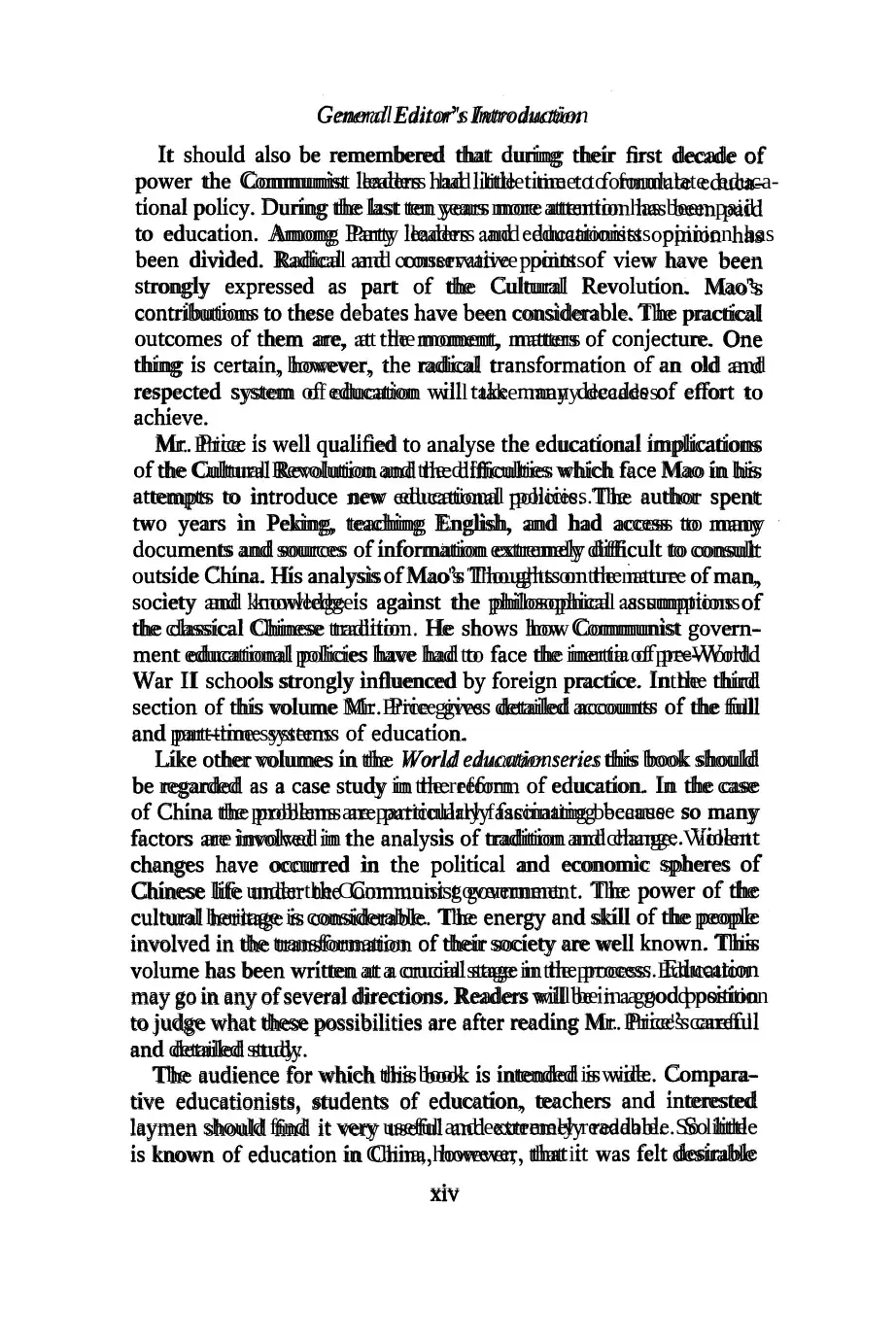
General Editor's Introduction
It should also be remembered that during their first decade of
power the Communist leaders had little time to formulate educa-
tional policy. During the last ten years more attention has been paid
to education. Among Party leaders and educationists opinion has
been divided. Radical and conservative pointsof view have been
strongly expressed as part of the Cultural Revolution. Mao's
contributions to these debates have been considerable. The practical
outcomes of them are, at the moment, matters of conjecture. One
thing is certain, however, the radical transformation of an old and
respected system of education will take many decadesof effort to
achieve.
Mr. Price is well qualified to analyse the educational implications
of the Cultural Revolution and the difficulties which face Mao in his
attempts to introduce new educational policies.The author spent
two years in Peking, teaching English, and had access to many
documents and sources of information extremely difficult to consult
outside China. His analysis of Mao's Thoughts on the nature of man,
society and knowledgeis against the philosophical assumptions of
the classical Chinese tradition. He shows how Communist govern-
ment educational policies have had to face the inertia of pre-World
War II schools strongly influenced by foreign practice. Inthe third
section of this volume Mr. Price gives detailed accounts of the full
and part-time systems of education.
Like other volumes in the World educationseries this book should
be regarded as a case study in the reform of education. In the case
of China the problems are particularly fascinating because so many
factors are involved in the analysis of tradition and change. Violent
changes have occurred in the political and economic spheres of
Chinese life under the Communist government. The power of the
cultural heritage is considerable. The energy and skill of the people
involved in the transformation of their society are well known. This
volume has been written at a crucial stage in the process. Education
may go in any of several directions. Readers will be in a good position
to judge what these possibilities are after reading Mr. Price's careful
and detailed study.
The audience for which this book is intended is wide. Compara-
tive educationists, students of education, teachers and interested
laymen should find it very useful and extremely readable. So little
is known of education in China, however, that it was felt desirable
XIV
It should also be remembered that during their first decade of
power the Communist leaders had little time to formulate educa-
tional policy. During the last ten years more attention has been paid
to education. Among Party leaders and educationists opinion has
been divided. Radical and conservative pointsof view have been
strongly expressed as part of the Cultural Revolution. Mao's
contributions to these debates have been considerable. The practical
outcomes of them are, at the moment, matters of conjecture. One
thing is certain, however, the radical transformation of an old and
respected system of education will take many decadesof effort to
achieve.
Mr. Price is well qualified to analyse the educational implications
of the Cultural Revolution and the difficulties which face Mao in his
attempts to introduce new educational policies.The author spent
two years in Peking, teaching English, and had access to many
documents and sources of information extremely difficult to consult
outside China. His analysis of Mao's Thoughts on the nature of man,
society and knowledgeis against the philosophical assumptions of
the classical Chinese tradition. He shows how Communist govern-
ment educational policies have had to face the inertia of pre-World
War II schools strongly influenced by foreign practice. Inthe third
section of this volume Mr. Price gives detailed accounts of the full
and part-time systems of education.
Like other volumes in the World educationseries this book should
be regarded as a case study in the reform of education. In the case
of China the problems are particularly fascinating because so many
factors are involved in the analysis of tradition and change. Violent
changes have occurred in the political and economic spheres of
Chinese life under the Communist government. The power of the
cultural heritage is considerable. The energy and skill of the people
involved in the transformation of their society are well known. This
volume has been written at a crucial stage in the process. Education
may go in any of several directions. Readers will be in a good position
to judge what these possibilities are after reading Mr. Price's careful
and detailed study.
The audience for which this book is intended is wide. Compara-
tive educationists, students of education, teachers and interested
laymen should find it very useful and extremely readable. So little
is known of education in China, however, that it was felt desirable
XIV
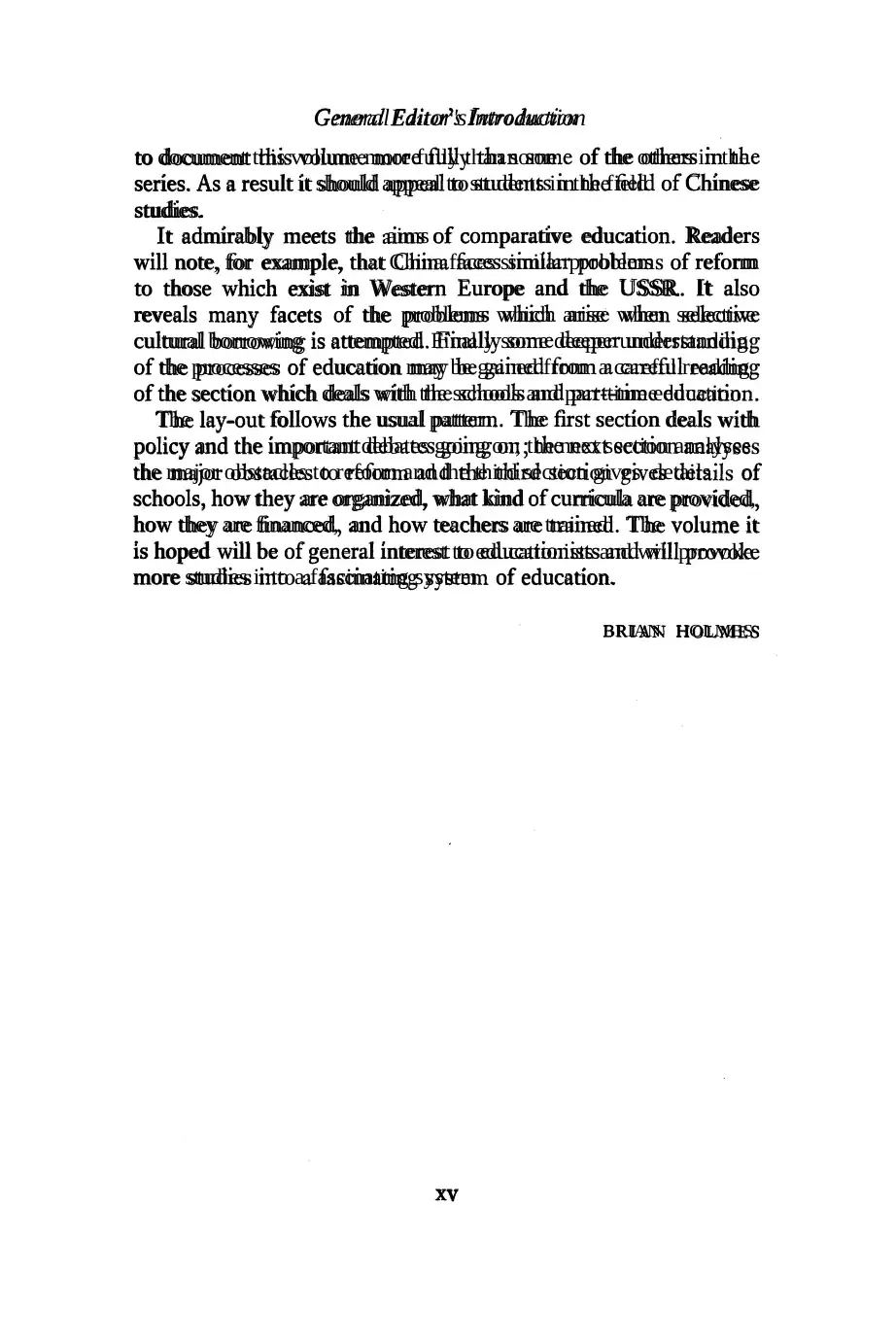
General Editor's Introduction
to document this volume more fully than some of the others in the
series. As a result it should appeal to students in the field of Chinese
studies.
It admirably meets the aims of comparative education. Readers
will note, for example, that China faces similar problems of reform
to those which exist in Western Europe and the USSR. It also
reveals many facets of the problems which arise when selective
cultural borrowing is attempted. Finally some deeper understanding
of the processes of education may be gained from a careful reading
of the section which deals with the schools and part-time education.
The lay-out follows the usual pattern. The first section deals with
policy and the important debates going on; the next section analyses
the major obstacles to reform and the third section gives details of
schools, how they are organized, what kind of curricula are provided,
how they are financed, and how teachers are trained. The volume it
is hoped will be of general interest to educationists and will provoke
more studies into a fascinating system of education.
BRIAN HOLMES
xv
to document this volume more fully than some of the others in the
series. As a result it should appeal to students in the field of Chinese
studies.
It admirably meets the aims of comparative education. Readers
will note, for example, that China faces similar problems of reform
to those which exist in Western Europe and the USSR. It also
reveals many facets of the problems which arise when selective
cultural borrowing is attempted. Finally some deeper understanding
of the processes of education may be gained from a careful reading
of the section which deals with the schools and part-time education.
The lay-out follows the usual pattern. The first section deals with
policy and the important debates going on; the next section analyses
the major obstacles to reform and the third section gives details of
schools, how they are organized, what kind of curricula are provided,
how they are financed, and how teachers are trained. The volume it
is hoped will be of general interest to educationists and will provoke
more studies into a fascinating system of education.
BRIAN HOLMES
xv
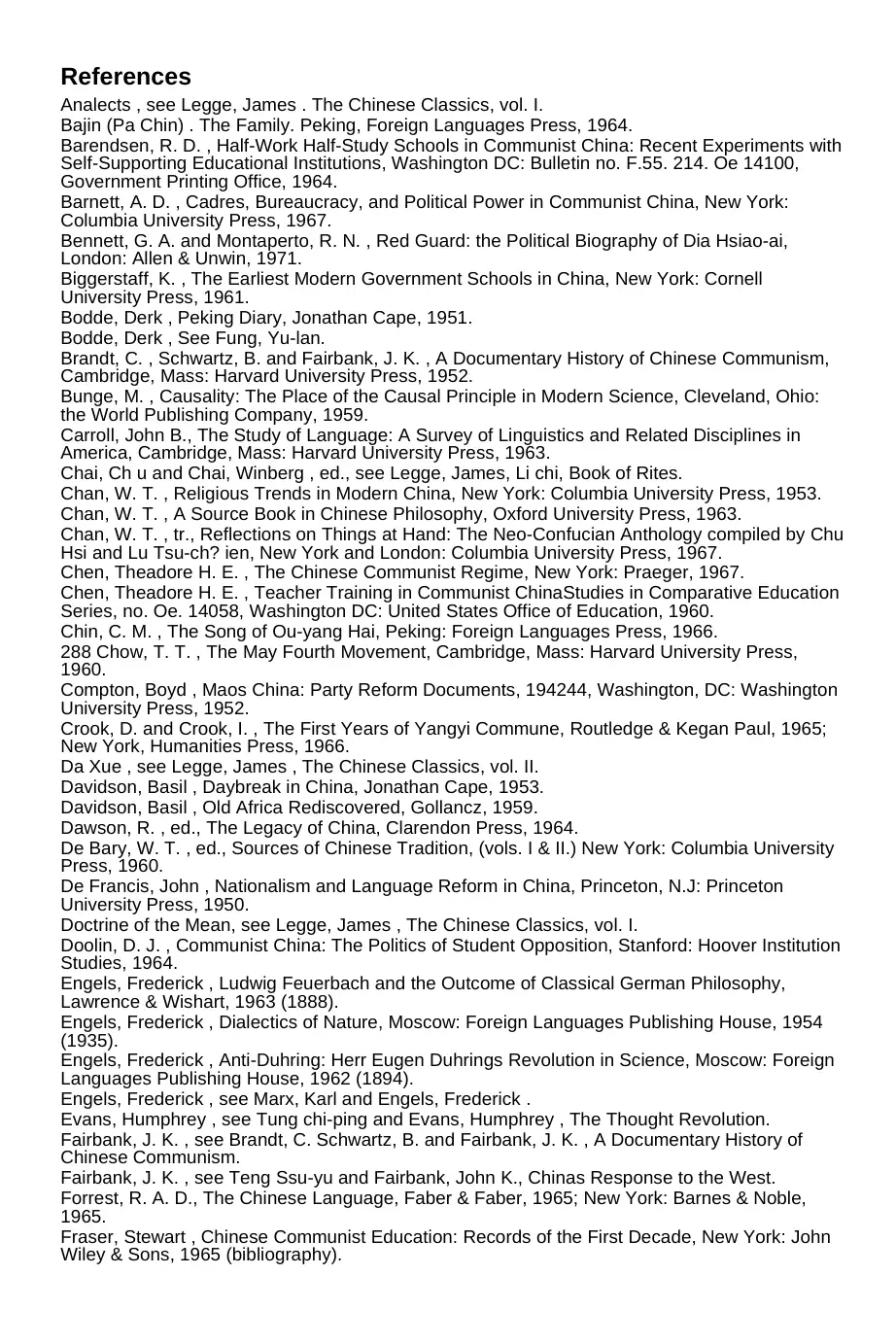
References
Analects , see Legge, James . The Chinese Classics, vol. I.
Bajin (Pa Chin) . The Family. Peking, Foreign Languages Press, 1964.
Barendsen, R. D. , Half-Work Half-Study Schools in Communist China: Recent Experiments with
Self-Supporting Educational Institutions, Washington DC: Bulletin no. F.55. 214. Oe 14100,
Government Printing Office, 1964.
Barnett, A. D. , Cadres, Bureaucracy, and Political Power in Communist China, New York:
Columbia University Press, 1967.
Bennett, G. A. and Montaperto, R. N. , Red Guard: the Political Biography of Dia Hsiao-ai,
London: Allen & Unwin, 1971.
Biggerstaff, K. , The Earliest Modern Government Schools in China, New York: Cornell
University Press, 1961.
Bodde, Derk , Peking Diary, Jonathan Cape, 1951.
Bodde, Derk , See Fung, Yu-lan.
Brandt, C. , Schwartz, B. and Fairbank, J. K. , A Documentary History of Chinese Communism,
Cambridge, Mass: Harvard University Press, 1952.
Bunge, M. , Causality: The Place of the Causal Principle in Modern Science, Cleveland, Ohio:
the World Publishing Company, 1959.
Carroll, John B., The Study of Language: A Survey of Linguistics and Related Disciplines in
America, Cambridge, Mass: Harvard University Press, 1963.
Chai, Ch u and Chai, Winberg , ed., see Legge, James, Li chi, Book of Rites.
Chan, W. T. , Religious Trends in Modern China, New York: Columbia University Press, 1953.
Chan, W. T. , A Source Book in Chinese Philosophy, Oxford University Press, 1963.
Chan, W. T. , tr., Reflections on Things at Hand: The Neo-Confucian Anthology compiled by Chu
Hsi and Lu Tsu-ch? ien, New York and London: Columbia University Press, 1967.
Chen, Theadore H. E. , The Chinese Communist Regime, New York: Praeger, 1967.
Chen, Theadore H. E. , Teacher Training in Communist ChinaStudies in Comparative Education
Series, no. Oe. 14058, Washington DC: United States Office of Education, 1960.
Chin, C. M. , The Song of Ou-yang Hai, Peking: Foreign Languages Press, 1966.
288 Chow, T. T. , The May Fourth Movement, Cambridge, Mass: Harvard University Press,
1960.
Compton, Boyd , Maos China: Party Reform Documents, 194244, Washington, DC: Washington
University Press, 1952.
Crook, D. and Crook, I. , The First Years of Yangyi Commune, Routledge & Kegan Paul, 1965;
New York, Humanities Press, 1966.
Da Xue , see Legge, James , The Chinese Classics, vol. II.
Davidson, Basil , Daybreak in China, Jonathan Cape, 1953.
Davidson, Basil , Old Africa Rediscovered, Gollancz, 1959.
Dawson, R. , ed., The Legacy of China, Clarendon Press, 1964.
De Bary, W. T. , ed., Sources of Chinese Tradition, (vols. I & II.) New York: Columbia University
Press, 1960.
De Francis, John , Nationalism and Language Reform in China, Princeton, N.J: Princeton
University Press, 1950.
Doctrine of the Mean, see Legge, James , The Chinese Classics, vol. I.
Doolin, D. J. , Communist China: The Politics of Student Opposition, Stanford: Hoover Institution
Studies, 1964.
Engels, Frederick , Ludwig Feuerbach and the Outcome of Classical German Philosophy,
Lawrence & Wishart, 1963 (1888).
Engels, Frederick , Dialectics of Nature, Moscow: Foreign Languages Publishing House, 1954
(1935).
Engels, Frederick , Anti-Duhring: Herr Eugen Duhrings Revolution in Science, Moscow: Foreign
Languages Publishing House, 1962 (1894).
Engels, Frederick , see Marx, Karl and Engels, Frederick .
Evans, Humphrey , see Tung chi-ping and Evans, Humphrey , The Thought Revolution.
Fairbank, J. K. , see Brandt, C. Schwartz, B. and Fairbank, J. K. , A Documentary History of
Chinese Communism.
Fairbank, J. K. , see Teng Ssu-yu and Fairbank, John K., Chinas Response to the West.
Forrest, R. A. D., The Chinese Language, Faber & Faber, 1965; New York: Barnes & Noble,
1965.
Fraser, Stewart , Chinese Communist Education: Records of the First Decade, New York: John
Wiley & Sons, 1965 (bibliography).
Analects , see Legge, James . The Chinese Classics, vol. I.
Bajin (Pa Chin) . The Family. Peking, Foreign Languages Press, 1964.
Barendsen, R. D. , Half-Work Half-Study Schools in Communist China: Recent Experiments with
Self-Supporting Educational Institutions, Washington DC: Bulletin no. F.55. 214. Oe 14100,
Government Printing Office, 1964.
Barnett, A. D. , Cadres, Bureaucracy, and Political Power in Communist China, New York:
Columbia University Press, 1967.
Bennett, G. A. and Montaperto, R. N. , Red Guard: the Political Biography of Dia Hsiao-ai,
London: Allen & Unwin, 1971.
Biggerstaff, K. , The Earliest Modern Government Schools in China, New York: Cornell
University Press, 1961.
Bodde, Derk , Peking Diary, Jonathan Cape, 1951.
Bodde, Derk , See Fung, Yu-lan.
Brandt, C. , Schwartz, B. and Fairbank, J. K. , A Documentary History of Chinese Communism,
Cambridge, Mass: Harvard University Press, 1952.
Bunge, M. , Causality: The Place of the Causal Principle in Modern Science, Cleveland, Ohio:
the World Publishing Company, 1959.
Carroll, John B., The Study of Language: A Survey of Linguistics and Related Disciplines in
America, Cambridge, Mass: Harvard University Press, 1963.
Chai, Ch u and Chai, Winberg , ed., see Legge, James, Li chi, Book of Rites.
Chan, W. T. , Religious Trends in Modern China, New York: Columbia University Press, 1953.
Chan, W. T. , A Source Book in Chinese Philosophy, Oxford University Press, 1963.
Chan, W. T. , tr., Reflections on Things at Hand: The Neo-Confucian Anthology compiled by Chu
Hsi and Lu Tsu-ch? ien, New York and London: Columbia University Press, 1967.
Chen, Theadore H. E. , The Chinese Communist Regime, New York: Praeger, 1967.
Chen, Theadore H. E. , Teacher Training in Communist ChinaStudies in Comparative Education
Series, no. Oe. 14058, Washington DC: United States Office of Education, 1960.
Chin, C. M. , The Song of Ou-yang Hai, Peking: Foreign Languages Press, 1966.
288 Chow, T. T. , The May Fourth Movement, Cambridge, Mass: Harvard University Press,
1960.
Compton, Boyd , Maos China: Party Reform Documents, 194244, Washington, DC: Washington
University Press, 1952.
Crook, D. and Crook, I. , The First Years of Yangyi Commune, Routledge & Kegan Paul, 1965;
New York, Humanities Press, 1966.
Da Xue , see Legge, James , The Chinese Classics, vol. II.
Davidson, Basil , Daybreak in China, Jonathan Cape, 1953.
Davidson, Basil , Old Africa Rediscovered, Gollancz, 1959.
Dawson, R. , ed., The Legacy of China, Clarendon Press, 1964.
De Bary, W. T. , ed., Sources of Chinese Tradition, (vols. I & II.) New York: Columbia University
Press, 1960.
De Francis, John , Nationalism and Language Reform in China, Princeton, N.J: Princeton
University Press, 1950.
Doctrine of the Mean, see Legge, James , The Chinese Classics, vol. I.
Doolin, D. J. , Communist China: The Politics of Student Opposition, Stanford: Hoover Institution
Studies, 1964.
Engels, Frederick , Ludwig Feuerbach and the Outcome of Classical German Philosophy,
Lawrence & Wishart, 1963 (1888).
Engels, Frederick , Dialectics of Nature, Moscow: Foreign Languages Publishing House, 1954
(1935).
Engels, Frederick , Anti-Duhring: Herr Eugen Duhrings Revolution in Science, Moscow: Foreign
Languages Publishing House, 1962 (1894).
Engels, Frederick , see Marx, Karl and Engels, Frederick .
Evans, Humphrey , see Tung chi-ping and Evans, Humphrey , The Thought Revolution.
Fairbank, J. K. , see Brandt, C. Schwartz, B. and Fairbank, J. K. , A Documentary History of
Chinese Communism.
Fairbank, J. K. , see Teng Ssu-yu and Fairbank, John K., Chinas Response to the West.
Forrest, R. A. D., The Chinese Language, Faber & Faber, 1965; New York: Barnes & Noble,
1965.
Fraser, Stewart , Chinese Communist Education: Records of the First Decade, New York: John
Wiley & Sons, 1965 (bibliography).
Paraphrase This Document
Need a fresh take? Get an instant paraphrase of this document with our AI Paraphraser
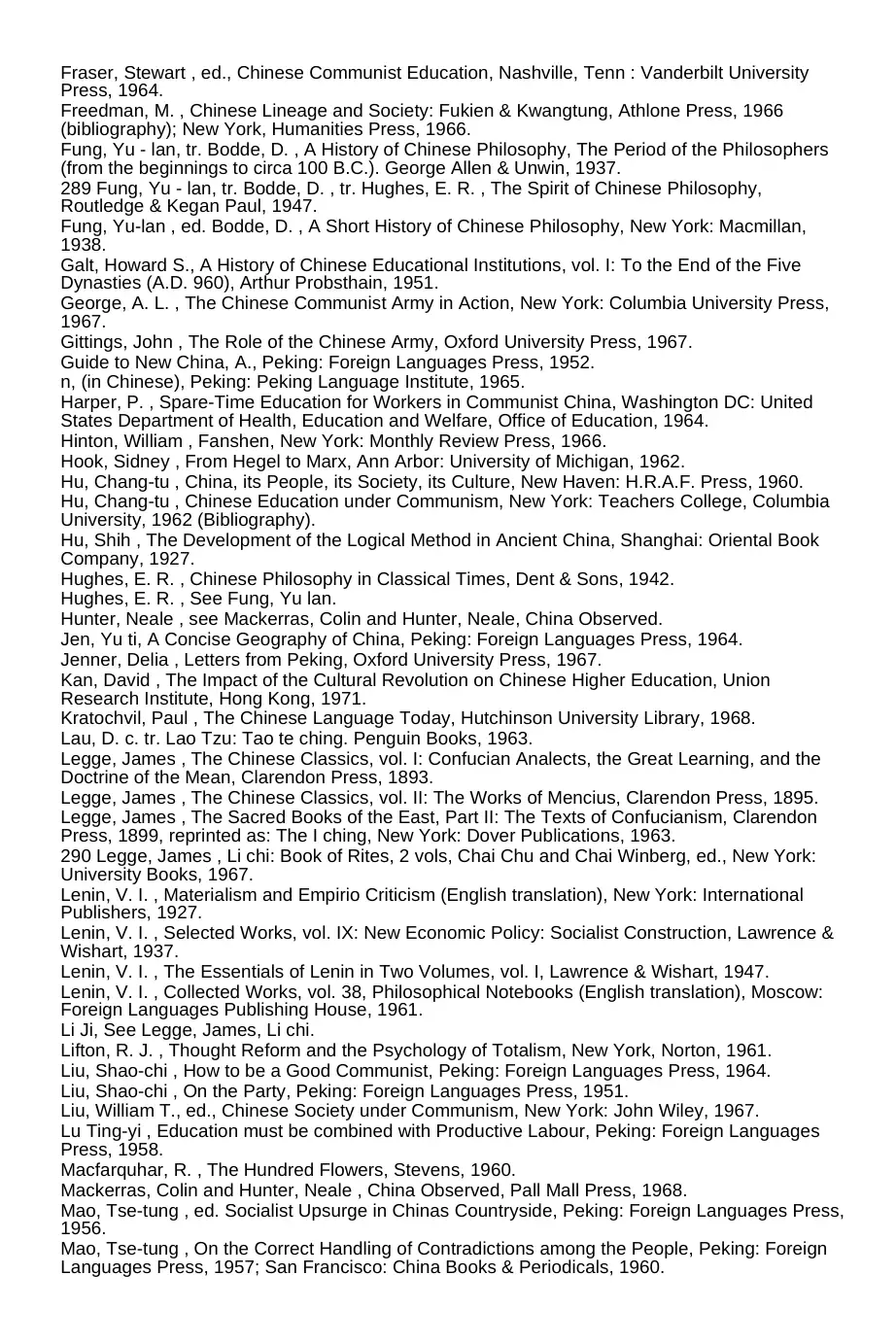
Fraser, Stewart , ed., Chinese Communist Education, Nashville, Tenn : Vanderbilt University
Press, 1964.
Freedman, M. , Chinese Lineage and Society: Fukien & Kwangtung, Athlone Press, 1966
(bibliography); New York, Humanities Press, 1966.
Fung, Yu - lan, tr. Bodde, D. , A History of Chinese Philosophy, The Period of the Philosophers
(from the beginnings to circa 100 B.C.). George Allen & Unwin, 1937.
289 Fung, Yu - lan, tr. Bodde, D. , tr. Hughes, E. R. , The Spirit of Chinese Philosophy,
Routledge & Kegan Paul, 1947.
Fung, Yu-lan , ed. Bodde, D. , A Short History of Chinese Philosophy, New York: Macmillan,
1938.
Galt, Howard S., A History of Chinese Educational Institutions, vol. I: To the End of the Five
Dynasties (A.D. 960), Arthur Probsthain, 1951.
George, A. L. , The Chinese Communist Army in Action, New York: Columbia University Press,
1967.
Gittings, John , The Role of the Chinese Army, Oxford University Press, 1967.
Guide to New China, A., Peking: Foreign Languages Press, 1952.
n, (in Chinese), Peking: Peking Language Institute, 1965.
Harper, P. , Spare-Time Education for Workers in Communist China, Washington DC: United
States Department of Health, Education and Welfare, Office of Education, 1964.
Hinton, William , Fanshen, New York: Monthly Review Press, 1966.
Hook, Sidney , From Hegel to Marx, Ann Arbor: University of Michigan, 1962.
Hu, Chang-tu , China, its People, its Society, its Culture, New Haven: H.R.A.F. Press, 1960.
Hu, Chang-tu , Chinese Education under Communism, New York: Teachers College, Columbia
University, 1962 (Bibliography).
Hu, Shih , The Development of the Logical Method in Ancient China, Shanghai: Oriental Book
Company, 1927.
Hughes, E. R. , Chinese Philosophy in Classical Times, Dent & Sons, 1942.
Hughes, E. R. , See Fung, Yu lan.
Hunter, Neale , see Mackerras, Colin and Hunter, Neale, China Observed.
Jen, Yu ti, A Concise Geography of China, Peking: Foreign Languages Press, 1964.
Jenner, Delia , Letters from Peking, Oxford University Press, 1967.
Kan, David , The Impact of the Cultural Revolution on Chinese Higher Education, Union
Research Institute, Hong Kong, 1971.
Kratochvil, Paul , The Chinese Language Today, Hutchinson University Library, 1968.
Lau, D. c. tr. Lao Tzu: Tao te ching. Penguin Books, 1963.
Legge, James , The Chinese Classics, vol. I: Confucian Analects, the Great Learning, and the
Doctrine of the Mean, Clarendon Press, 1893.
Legge, James , The Chinese Classics, vol. II: The Works of Mencius, Clarendon Press, 1895.
Legge, James , The Sacred Books of the East, Part II: The Texts of Confucianism, Clarendon
Press, 1899, reprinted as: The I ching, New York: Dover Publications, 1963.
290 Legge, James , Li chi: Book of Rites, 2 vols, Chai Chu and Chai Winberg, ed., New York:
University Books, 1967.
Lenin, V. I. , Materialism and Empirio Criticism (English translation), New York: International
Publishers, 1927.
Lenin, V. I. , Selected Works, vol. IX: New Economic Policy: Socialist Construction, Lawrence &
Wishart, 1937.
Lenin, V. I. , The Essentials of Lenin in Two Volumes, vol. I, Lawrence & Wishart, 1947.
Lenin, V. I. , Collected Works, vol. 38, Philosophical Notebooks (English translation), Moscow:
Foreign Languages Publishing House, 1961.
Li Ji, See Legge, James, Li chi.
Lifton, R. J. , Thought Reform and the Psychology of Totalism, New York, Norton, 1961.
Liu, Shao-chi , How to be a Good Communist, Peking: Foreign Languages Press, 1964.
Liu, Shao-chi , On the Party, Peking: Foreign Languages Press, 1951.
Liu, William T., ed., Chinese Society under Communism, New York: John Wiley, 1967.
Lu Ting-yi , Education must be combined with Productive Labour, Peking: Foreign Languages
Press, 1958.
Macfarquhar, R. , The Hundred Flowers, Stevens, 1960.
Mackerras, Colin and Hunter, Neale , China Observed, Pall Mall Press, 1968.
Mao, Tse-tung , ed. Socialist Upsurge in Chinas Countryside, Peking: Foreign Languages Press,
1956.
Mao, Tse-tung , On the Correct Handling of Contradictions among the People, Peking: Foreign
Languages Press, 1957; San Francisco: China Books & Periodicals, 1960.
Press, 1964.
Freedman, M. , Chinese Lineage and Society: Fukien & Kwangtung, Athlone Press, 1966
(bibliography); New York, Humanities Press, 1966.
Fung, Yu - lan, tr. Bodde, D. , A History of Chinese Philosophy, The Period of the Philosophers
(from the beginnings to circa 100 B.C.). George Allen & Unwin, 1937.
289 Fung, Yu - lan, tr. Bodde, D. , tr. Hughes, E. R. , The Spirit of Chinese Philosophy,
Routledge & Kegan Paul, 1947.
Fung, Yu-lan , ed. Bodde, D. , A Short History of Chinese Philosophy, New York: Macmillan,
1938.
Galt, Howard S., A History of Chinese Educational Institutions, vol. I: To the End of the Five
Dynasties (A.D. 960), Arthur Probsthain, 1951.
George, A. L. , The Chinese Communist Army in Action, New York: Columbia University Press,
1967.
Gittings, John , The Role of the Chinese Army, Oxford University Press, 1967.
Guide to New China, A., Peking: Foreign Languages Press, 1952.
n, (in Chinese), Peking: Peking Language Institute, 1965.
Harper, P. , Spare-Time Education for Workers in Communist China, Washington DC: United
States Department of Health, Education and Welfare, Office of Education, 1964.
Hinton, William , Fanshen, New York: Monthly Review Press, 1966.
Hook, Sidney , From Hegel to Marx, Ann Arbor: University of Michigan, 1962.
Hu, Chang-tu , China, its People, its Society, its Culture, New Haven: H.R.A.F. Press, 1960.
Hu, Chang-tu , Chinese Education under Communism, New York: Teachers College, Columbia
University, 1962 (Bibliography).
Hu, Shih , The Development of the Logical Method in Ancient China, Shanghai: Oriental Book
Company, 1927.
Hughes, E. R. , Chinese Philosophy in Classical Times, Dent & Sons, 1942.
Hughes, E. R. , See Fung, Yu lan.
Hunter, Neale , see Mackerras, Colin and Hunter, Neale, China Observed.
Jen, Yu ti, A Concise Geography of China, Peking: Foreign Languages Press, 1964.
Jenner, Delia , Letters from Peking, Oxford University Press, 1967.
Kan, David , The Impact of the Cultural Revolution on Chinese Higher Education, Union
Research Institute, Hong Kong, 1971.
Kratochvil, Paul , The Chinese Language Today, Hutchinson University Library, 1968.
Lau, D. c. tr. Lao Tzu: Tao te ching. Penguin Books, 1963.
Legge, James , The Chinese Classics, vol. I: Confucian Analects, the Great Learning, and the
Doctrine of the Mean, Clarendon Press, 1893.
Legge, James , The Chinese Classics, vol. II: The Works of Mencius, Clarendon Press, 1895.
Legge, James , The Sacred Books of the East, Part II: The Texts of Confucianism, Clarendon
Press, 1899, reprinted as: The I ching, New York: Dover Publications, 1963.
290 Legge, James , Li chi: Book of Rites, 2 vols, Chai Chu and Chai Winberg, ed., New York:
University Books, 1967.
Lenin, V. I. , Materialism and Empirio Criticism (English translation), New York: International
Publishers, 1927.
Lenin, V. I. , Selected Works, vol. IX: New Economic Policy: Socialist Construction, Lawrence &
Wishart, 1937.
Lenin, V. I. , The Essentials of Lenin in Two Volumes, vol. I, Lawrence & Wishart, 1947.
Lenin, V. I. , Collected Works, vol. 38, Philosophical Notebooks (English translation), Moscow:
Foreign Languages Publishing House, 1961.
Li Ji, See Legge, James, Li chi.
Lifton, R. J. , Thought Reform and the Psychology of Totalism, New York, Norton, 1961.
Liu, Shao-chi , How to be a Good Communist, Peking: Foreign Languages Press, 1964.
Liu, Shao-chi , On the Party, Peking: Foreign Languages Press, 1951.
Liu, William T., ed., Chinese Society under Communism, New York: John Wiley, 1967.
Lu Ting-yi , Education must be combined with Productive Labour, Peking: Foreign Languages
Press, 1958.
Macfarquhar, R. , The Hundred Flowers, Stevens, 1960.
Mackerras, Colin and Hunter, Neale , China Observed, Pall Mall Press, 1968.
Mao, Tse-tung , ed. Socialist Upsurge in Chinas Countryside, Peking: Foreign Languages Press,
1956.
Mao, Tse-tung , On the Correct Handling of Contradictions among the People, Peking: Foreign
Languages Press, 1957; San Francisco: China Books & Periodicals, 1960.
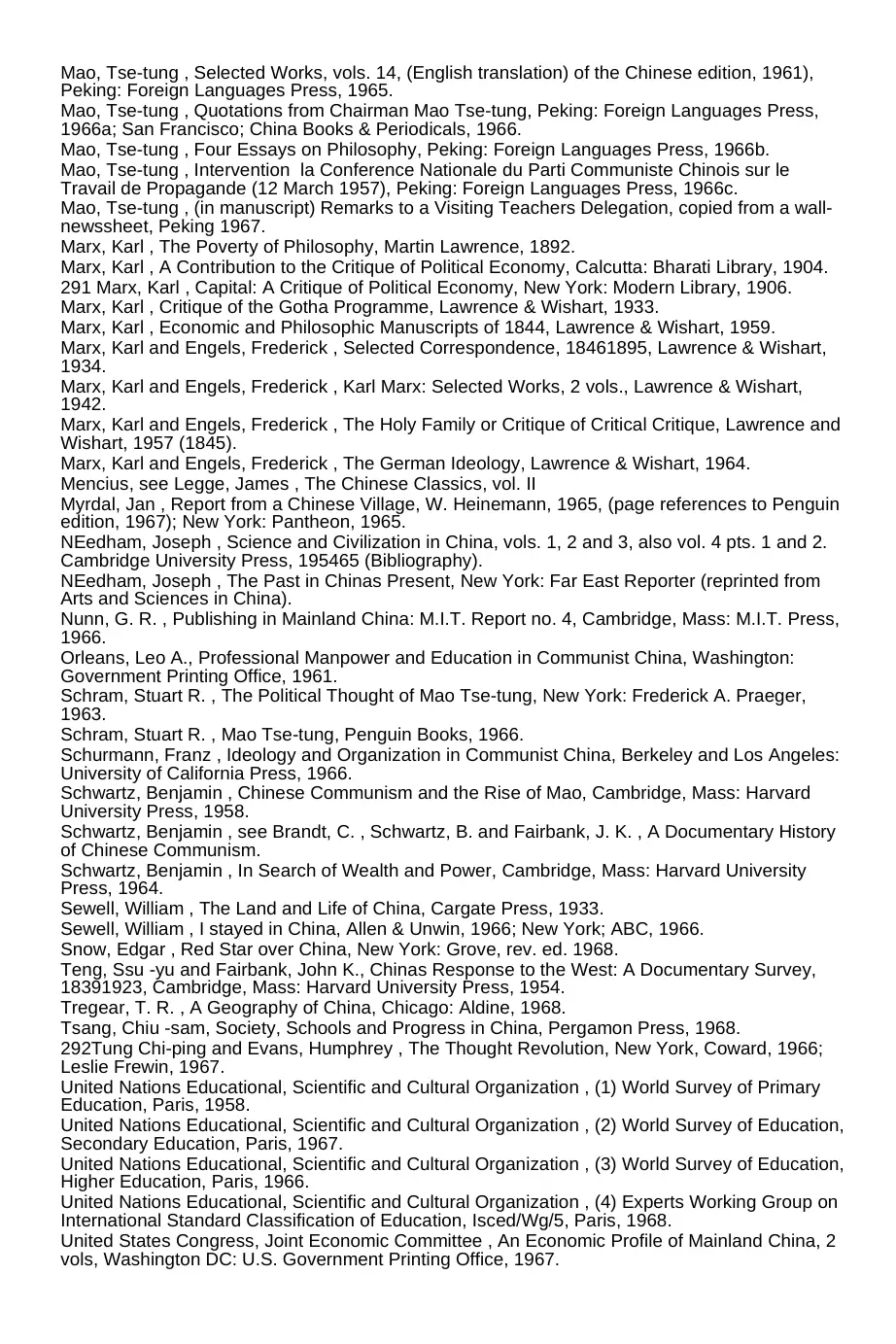
Mao, Tse-tung , Selected Works, vols. 14, (English translation) of the Chinese edition, 1961),
Peking: Foreign Languages Press, 1965.
Mao, Tse-tung , Quotations from Chairman Mao Tse-tung, Peking: Foreign Languages Press,
1966a; San Francisco; China Books & Periodicals, 1966.
Mao, Tse-tung , Four Essays on Philosophy, Peking: Foreign Languages Press, 1966b.
Mao, Tse-tung , Intervention la Conference Nationale du Parti Communiste Chinois sur le
Travail de Propagande (12 March 1957), Peking: Foreign Languages Press, 1966c.
Mao, Tse-tung , (in manuscript) Remarks to a Visiting Teachers Delegation, copied from a wall-
newssheet, Peking 1967.
Marx, Karl , The Poverty of Philosophy, Martin Lawrence, 1892.
Marx, Karl , A Contribution to the Critique of Political Economy, Calcutta: Bharati Library, 1904.
291 Marx, Karl , Capital: A Critique of Political Economy, New York: Modern Library, 1906.
Marx, Karl , Critique of the Gotha Programme, Lawrence & Wishart, 1933.
Marx, Karl , Economic and Philosophic Manuscripts of 1844, Lawrence & Wishart, 1959.
Marx, Karl and Engels, Frederick , Selected Correspondence, 18461895, Lawrence & Wishart,
1934.
Marx, Karl and Engels, Frederick , Karl Marx: Selected Works, 2 vols., Lawrence & Wishart,
1942.
Marx, Karl and Engels, Frederick , The Holy Family or Critique of Critical Critique, Lawrence and
Wishart, 1957 (1845).
Marx, Karl and Engels, Frederick , The German Ideology, Lawrence & Wishart, 1964.
Mencius, see Legge, James , The Chinese Classics, vol. II
Myrdal, Jan , Report from a Chinese Village, W. Heinemann, 1965, (page references to Penguin
edition, 1967); New York: Pantheon, 1965.
NEedham, Joseph , Science and Civilization in China, vols. 1, 2 and 3, also vol. 4 pts. 1 and 2.
Cambridge University Press, 195465 (Bibliography).
NEedham, Joseph , The Past in Chinas Present, New York: Far East Reporter (reprinted from
Arts and Sciences in China).
Nunn, G. R. , Publishing in Mainland China: M.I.T. Report no. 4, Cambridge, Mass: M.I.T. Press,
1966.
Orleans, Leo A., Professional Manpower and Education in Communist China, Washington:
Government Printing Office, 1961.
Schram, Stuart R. , The Political Thought of Mao Tse-tung, New York: Frederick A. Praeger,
1963.
Schram, Stuart R. , Mao Tse-tung, Penguin Books, 1966.
Schurmann, Franz , Ideology and Organization in Communist China, Berkeley and Los Angeles:
University of California Press, 1966.
Schwartz, Benjamin , Chinese Communism and the Rise of Mao, Cambridge, Mass: Harvard
University Press, 1958.
Schwartz, Benjamin , see Brandt, C. , Schwartz, B. and Fairbank, J. K. , A Documentary History
of Chinese Communism.
Schwartz, Benjamin , In Search of Wealth and Power, Cambridge, Mass: Harvard University
Press, 1964.
Sewell, William , The Land and Life of China, Cargate Press, 1933.
Sewell, William , I stayed in China, Allen & Unwin, 1966; New York; ABC, 1966.
Snow, Edgar , Red Star over China, New York: Grove, rev. ed. 1968.
Teng, Ssu -yu and Fairbank, John K., Chinas Response to the West: A Documentary Survey,
18391923, Cambridge, Mass: Harvard University Press, 1954.
Tregear, T. R. , A Geography of China, Chicago: Aldine, 1968.
Tsang, Chiu -sam, Society, Schools and Progress in China, Pergamon Press, 1968.
292Tung Chi-ping and Evans, Humphrey , The Thought Revolution, New York, Coward, 1966;
Leslie Frewin, 1967.
United Nations Educational, Scientific and Cultural Organization , (1) World Survey of Primary
Education, Paris, 1958.
United Nations Educational, Scientific and Cultural Organization , (2) World Survey of Education,
Secondary Education, Paris, 1967.
United Nations Educational, Scientific and Cultural Organization , (3) World Survey of Education,
Higher Education, Paris, 1966.
United Nations Educational, Scientific and Cultural Organization , (4) Experts Working Group on
International Standard Classification of Education, Isced/Wg/5, Paris, 1968.
United States Congress, Joint Economic Committee , An Economic Profile of Mainland China, 2
vols, Washington DC: U.S. Government Printing Office, 1967.
Peking: Foreign Languages Press, 1965.
Mao, Tse-tung , Quotations from Chairman Mao Tse-tung, Peking: Foreign Languages Press,
1966a; San Francisco; China Books & Periodicals, 1966.
Mao, Tse-tung , Four Essays on Philosophy, Peking: Foreign Languages Press, 1966b.
Mao, Tse-tung , Intervention la Conference Nationale du Parti Communiste Chinois sur le
Travail de Propagande (12 March 1957), Peking: Foreign Languages Press, 1966c.
Mao, Tse-tung , (in manuscript) Remarks to a Visiting Teachers Delegation, copied from a wall-
newssheet, Peking 1967.
Marx, Karl , The Poverty of Philosophy, Martin Lawrence, 1892.
Marx, Karl , A Contribution to the Critique of Political Economy, Calcutta: Bharati Library, 1904.
291 Marx, Karl , Capital: A Critique of Political Economy, New York: Modern Library, 1906.
Marx, Karl , Critique of the Gotha Programme, Lawrence & Wishart, 1933.
Marx, Karl , Economic and Philosophic Manuscripts of 1844, Lawrence & Wishart, 1959.
Marx, Karl and Engels, Frederick , Selected Correspondence, 18461895, Lawrence & Wishart,
1934.
Marx, Karl and Engels, Frederick , Karl Marx: Selected Works, 2 vols., Lawrence & Wishart,
1942.
Marx, Karl and Engels, Frederick , The Holy Family or Critique of Critical Critique, Lawrence and
Wishart, 1957 (1845).
Marx, Karl and Engels, Frederick , The German Ideology, Lawrence & Wishart, 1964.
Mencius, see Legge, James , The Chinese Classics, vol. II
Myrdal, Jan , Report from a Chinese Village, W. Heinemann, 1965, (page references to Penguin
edition, 1967); New York: Pantheon, 1965.
NEedham, Joseph , Science and Civilization in China, vols. 1, 2 and 3, also vol. 4 pts. 1 and 2.
Cambridge University Press, 195465 (Bibliography).
NEedham, Joseph , The Past in Chinas Present, New York: Far East Reporter (reprinted from
Arts and Sciences in China).
Nunn, G. R. , Publishing in Mainland China: M.I.T. Report no. 4, Cambridge, Mass: M.I.T. Press,
1966.
Orleans, Leo A., Professional Manpower and Education in Communist China, Washington:
Government Printing Office, 1961.
Schram, Stuart R. , The Political Thought of Mao Tse-tung, New York: Frederick A. Praeger,
1963.
Schram, Stuart R. , Mao Tse-tung, Penguin Books, 1966.
Schurmann, Franz , Ideology and Organization in Communist China, Berkeley and Los Angeles:
University of California Press, 1966.
Schwartz, Benjamin , Chinese Communism and the Rise of Mao, Cambridge, Mass: Harvard
University Press, 1958.
Schwartz, Benjamin , see Brandt, C. , Schwartz, B. and Fairbank, J. K. , A Documentary History
of Chinese Communism.
Schwartz, Benjamin , In Search of Wealth and Power, Cambridge, Mass: Harvard University
Press, 1964.
Sewell, William , The Land and Life of China, Cargate Press, 1933.
Sewell, William , I stayed in China, Allen & Unwin, 1966; New York; ABC, 1966.
Snow, Edgar , Red Star over China, New York: Grove, rev. ed. 1968.
Teng, Ssu -yu and Fairbank, John K., Chinas Response to the West: A Documentary Survey,
18391923, Cambridge, Mass: Harvard University Press, 1954.
Tregear, T. R. , A Geography of China, Chicago: Aldine, 1968.
Tsang, Chiu -sam, Society, Schools and Progress in China, Pergamon Press, 1968.
292Tung Chi-ping and Evans, Humphrey , The Thought Revolution, New York, Coward, 1966;
Leslie Frewin, 1967.
United Nations Educational, Scientific and Cultural Organization , (1) World Survey of Primary
Education, Paris, 1958.
United Nations Educational, Scientific and Cultural Organization , (2) World Survey of Education,
Secondary Education, Paris, 1967.
United Nations Educational, Scientific and Cultural Organization , (3) World Survey of Education,
Higher Education, Paris, 1966.
United Nations Educational, Scientific and Cultural Organization , (4) Experts Working Group on
International Standard Classification of Education, Isced/Wg/5, Paris, 1968.
United States Congress, Joint Economic Committee , An Economic Profile of Mainland China, 2
vols, Washington DC: U.S. Government Printing Office, 1967.
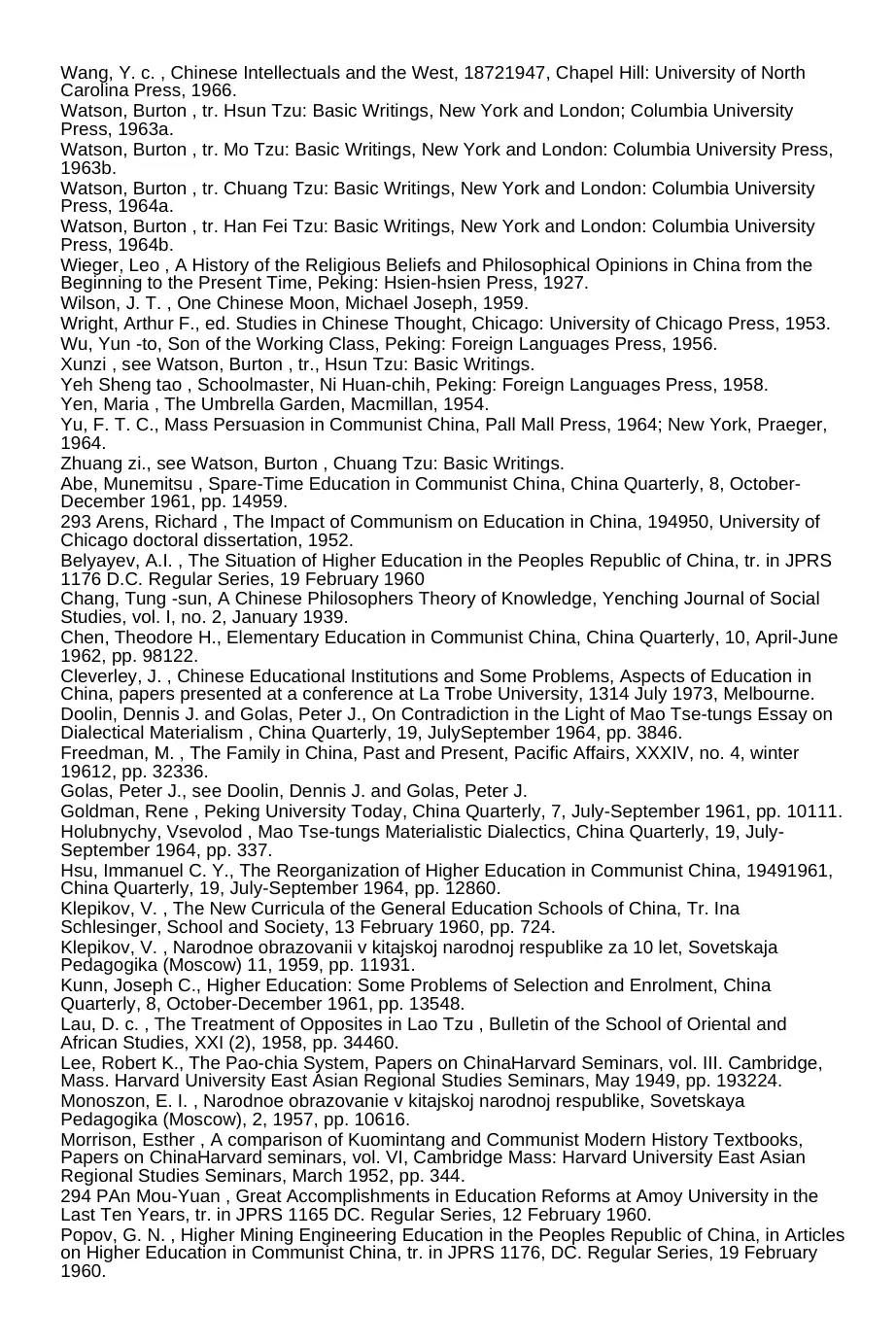
Wang, Y. c. , Chinese Intellectuals and the West, 18721947, Chapel Hill: University of North
Carolina Press, 1966.
Watson, Burton , tr. Hsun Tzu: Basic Writings, New York and London; Columbia University
Press, 1963a.
Watson, Burton , tr. Mo Tzu: Basic Writings, New York and London: Columbia University Press,
1963b.
Watson, Burton , tr. Chuang Tzu: Basic Writings, New York and London: Columbia University
Press, 1964a.
Watson, Burton , tr. Han Fei Tzu: Basic Writings, New York and London: Columbia University
Press, 1964b.
Wieger, Leo , A History of the Religious Beliefs and Philosophical Opinions in China from the
Beginning to the Present Time, Peking: Hsien-hsien Press, 1927.
Wilson, J. T. , One Chinese Moon, Michael Joseph, 1959.
Wright, Arthur F., ed. Studies in Chinese Thought, Chicago: University of Chicago Press, 1953.
Wu, Yun -to, Son of the Working Class, Peking: Foreign Languages Press, 1956.
Xunzi , see Watson, Burton , tr., Hsun Tzu: Basic Writings.
Yeh Sheng tao , Schoolmaster, Ni Huan-chih, Peking: Foreign Languages Press, 1958.
Yen, Maria , The Umbrella Garden, Macmillan, 1954.
Yu, F. T. C., Mass Persuasion in Communist China, Pall Mall Press, 1964; New York, Praeger,
1964.
Zhuang zi., see Watson, Burton , Chuang Tzu: Basic Writings.
Abe, Munemitsu , Spare-Time Education in Communist China, China Quarterly, 8, October-
December 1961, pp. 14959.
293 Arens, Richard , The Impact of Communism on Education in China, 194950, University of
Chicago doctoral dissertation, 1952.
Belyayev, A.I. , The Situation of Higher Education in the Peoples Republic of China, tr. in JPRS
1176 D.C. Regular Series, 19 February 1960
Chang, Tung -sun, A Chinese Philosophers Theory of Knowledge, Yenching Journal of Social
Studies, vol. I, no. 2, January 1939.
Chen, Theodore H., Elementary Education in Communist China, China Quarterly, 10, April-June
1962, pp. 98122.
Cleverley, J. , Chinese Educational Institutions and Some Problems, Aspects of Education in
China, papers presented at a conference at La Trobe University, 1314 July 1973, Melbourne.
Doolin, Dennis J. and Golas, Peter J., On Contradiction in the Light of Mao Tse-tungs Essay on
Dialectical Materialism , China Quarterly, 19, JulySeptember 1964, pp. 3846.
Freedman, M. , The Family in China, Past and Present, Pacific Affairs, XXXIV, no. 4, winter
19612, pp. 32336.
Golas, Peter J., see Doolin, Dennis J. and Golas, Peter J.
Goldman, Rene , Peking University Today, China Quarterly, 7, July-September 1961, pp. 10111.
Holubnychy, Vsevolod , Mao Tse-tungs Materialistic Dialectics, China Quarterly, 19, July-
September 1964, pp. 337.
Hsu, Immanuel C. Y., The Reorganization of Higher Education in Communist China, 19491961,
China Quarterly, 19, July-September 1964, pp. 12860.
Klepikov, V. , The New Curricula of the General Education Schools of China, Tr. Ina
Schlesinger, School and Society, 13 February 1960, pp. 724.
Klepikov, V. , Narodnoe obrazovanii v kitajskoj narodnoj respublike za 10 let, Sovetskaja
Pedagogika (Moscow) 11, 1959, pp. 11931.
Kunn, Joseph C., Higher Education: Some Problems of Selection and Enrolment, China
Quarterly, 8, October-December 1961, pp. 13548.
Lau, D. c. , The Treatment of Opposites in Lao Tzu , Bulletin of the School of Oriental and
African Studies, XXI (2), 1958, pp. 34460.
Lee, Robert K., The Pao-chia System, Papers on ChinaHarvard Seminars, vol. III. Cambridge,
Mass. Harvard University East Asian Regional Studies Seminars, May 1949, pp. 193224.
Monoszon, E. I. , Narodnoe obrazovanie v kitajskoj narodnoj respublike, Sovetskaya
Pedagogika (Moscow), 2, 1957, pp. 10616.
Morrison, Esther , A comparison of Kuomintang and Communist Modern History Textbooks,
Papers on ChinaHarvard seminars, vol. VI, Cambridge Mass: Harvard University East Asian
Regional Studies Seminars, March 1952, pp. 344.
294 PAn Mou-Yuan , Great Accomplishments in Education Reforms at Amoy University in the
Last Ten Years, tr. in JPRS 1165 DC. Regular Series, 12 February 1960.
Popov, G. N. , Higher Mining Engineering Education in the Peoples Republic of China, in Articles
on Higher Education in Communist China, tr. in JPRS 1176, DC. Regular Series, 19 February
1960.
Carolina Press, 1966.
Watson, Burton , tr. Hsun Tzu: Basic Writings, New York and London; Columbia University
Press, 1963a.
Watson, Burton , tr. Mo Tzu: Basic Writings, New York and London: Columbia University Press,
1963b.
Watson, Burton , tr. Chuang Tzu: Basic Writings, New York and London: Columbia University
Press, 1964a.
Watson, Burton , tr. Han Fei Tzu: Basic Writings, New York and London: Columbia University
Press, 1964b.
Wieger, Leo , A History of the Religious Beliefs and Philosophical Opinions in China from the
Beginning to the Present Time, Peking: Hsien-hsien Press, 1927.
Wilson, J. T. , One Chinese Moon, Michael Joseph, 1959.
Wright, Arthur F., ed. Studies in Chinese Thought, Chicago: University of Chicago Press, 1953.
Wu, Yun -to, Son of the Working Class, Peking: Foreign Languages Press, 1956.
Xunzi , see Watson, Burton , tr., Hsun Tzu: Basic Writings.
Yeh Sheng tao , Schoolmaster, Ni Huan-chih, Peking: Foreign Languages Press, 1958.
Yen, Maria , The Umbrella Garden, Macmillan, 1954.
Yu, F. T. C., Mass Persuasion in Communist China, Pall Mall Press, 1964; New York, Praeger,
1964.
Zhuang zi., see Watson, Burton , Chuang Tzu: Basic Writings.
Abe, Munemitsu , Spare-Time Education in Communist China, China Quarterly, 8, October-
December 1961, pp. 14959.
293 Arens, Richard , The Impact of Communism on Education in China, 194950, University of
Chicago doctoral dissertation, 1952.
Belyayev, A.I. , The Situation of Higher Education in the Peoples Republic of China, tr. in JPRS
1176 D.C. Regular Series, 19 February 1960
Chang, Tung -sun, A Chinese Philosophers Theory of Knowledge, Yenching Journal of Social
Studies, vol. I, no. 2, January 1939.
Chen, Theodore H., Elementary Education in Communist China, China Quarterly, 10, April-June
1962, pp. 98122.
Cleverley, J. , Chinese Educational Institutions and Some Problems, Aspects of Education in
China, papers presented at a conference at La Trobe University, 1314 July 1973, Melbourne.
Doolin, Dennis J. and Golas, Peter J., On Contradiction in the Light of Mao Tse-tungs Essay on
Dialectical Materialism , China Quarterly, 19, JulySeptember 1964, pp. 3846.
Freedman, M. , The Family in China, Past and Present, Pacific Affairs, XXXIV, no. 4, winter
19612, pp. 32336.
Golas, Peter J., see Doolin, Dennis J. and Golas, Peter J.
Goldman, Rene , Peking University Today, China Quarterly, 7, July-September 1961, pp. 10111.
Holubnychy, Vsevolod , Mao Tse-tungs Materialistic Dialectics, China Quarterly, 19, July-
September 1964, pp. 337.
Hsu, Immanuel C. Y., The Reorganization of Higher Education in Communist China, 19491961,
China Quarterly, 19, July-September 1964, pp. 12860.
Klepikov, V. , The New Curricula of the General Education Schools of China, Tr. Ina
Schlesinger, School and Society, 13 February 1960, pp. 724.
Klepikov, V. , Narodnoe obrazovanii v kitajskoj narodnoj respublike za 10 let, Sovetskaja
Pedagogika (Moscow) 11, 1959, pp. 11931.
Kunn, Joseph C., Higher Education: Some Problems of Selection and Enrolment, China
Quarterly, 8, October-December 1961, pp. 13548.
Lau, D. c. , The Treatment of Opposites in Lao Tzu , Bulletin of the School of Oriental and
African Studies, XXI (2), 1958, pp. 34460.
Lee, Robert K., The Pao-chia System, Papers on ChinaHarvard Seminars, vol. III. Cambridge,
Mass. Harvard University East Asian Regional Studies Seminars, May 1949, pp. 193224.
Monoszon, E. I. , Narodnoe obrazovanie v kitajskoj narodnoj respublike, Sovetskaya
Pedagogika (Moscow), 2, 1957, pp. 10616.
Morrison, Esther , A comparison of Kuomintang and Communist Modern History Textbooks,
Papers on ChinaHarvard seminars, vol. VI, Cambridge Mass: Harvard University East Asian
Regional Studies Seminars, March 1952, pp. 344.
294 PAn Mou-Yuan , Great Accomplishments in Education Reforms at Amoy University in the
Last Ten Years, tr. in JPRS 1165 DC. Regular Series, 12 February 1960.
Popov, G. N. , Higher Mining Engineering Education in the Peoples Republic of China, in Articles
on Higher Education in Communist China, tr. in JPRS 1176, DC. Regular Series, 19 February
1960.
Secure Best Marks with AI Grader
Need help grading? Try our AI Grader for instant feedback on your assignments.
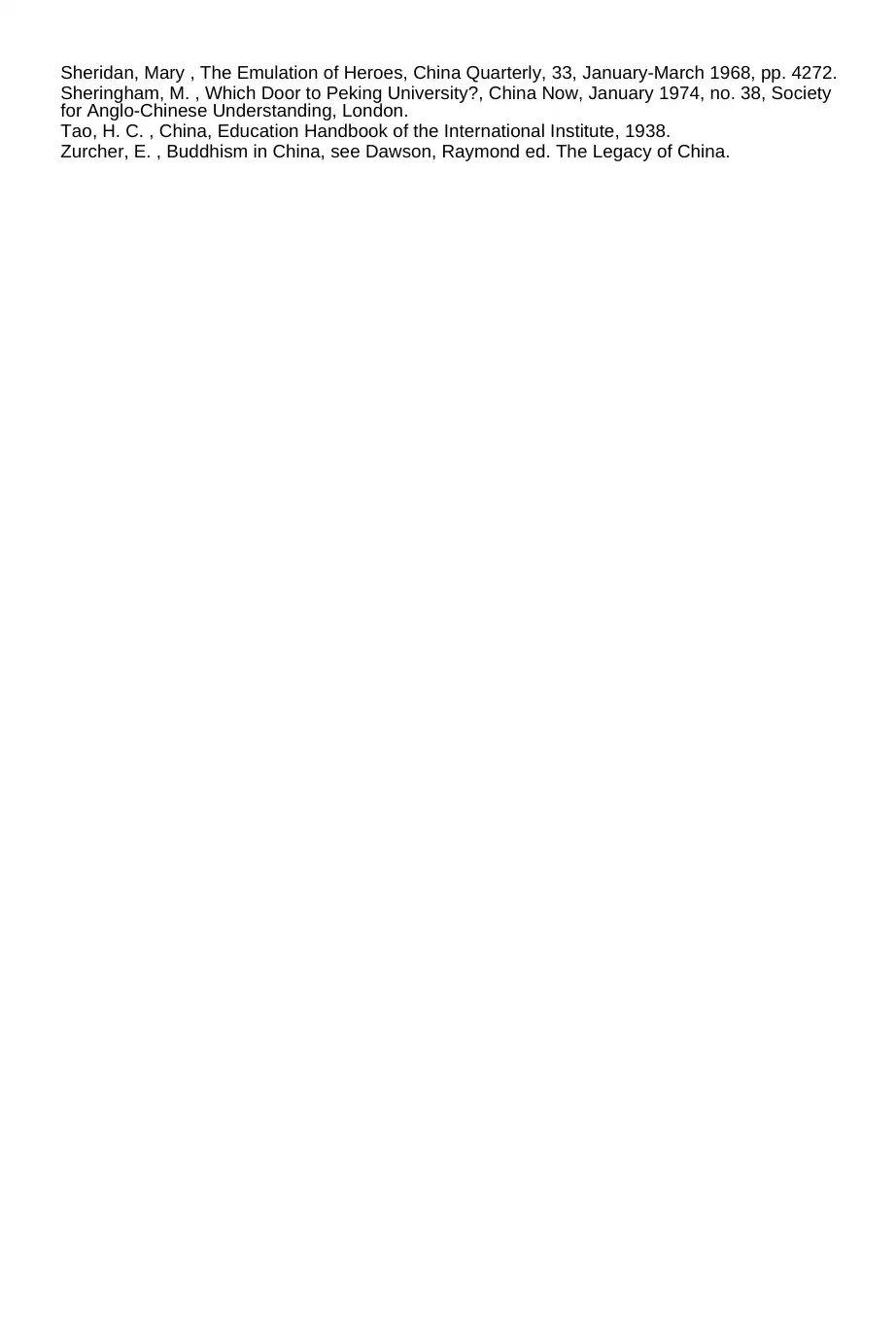
Sheridan, Mary , The Emulation of Heroes, China Quarterly, 33, January-March 1968, pp. 4272.
Sheringham, M. , Which Door to Peking University?, China Now, January 1974, no. 38, Society
for Anglo-Chinese Understanding, London.
Tao, H. C. , China, Education Handbook of the International Institute, 1938.
Zurcher, E. , Buddhism in China, see Dawson, Raymond ed. The Legacy of China.
Sheringham, M. , Which Door to Peking University?, China Now, January 1974, no. 38, Society
for Anglo-Chinese Understanding, London.
Tao, H. C. , China, Education Handbook of the International Institute, 1938.
Zurcher, E. , Buddhism in China, see Dawson, Raymond ed. The Legacy of China.
1 out of 23
Related Documents
Your All-in-One AI-Powered Toolkit for Academic Success.
+13062052269
info@desklib.com
Available 24*7 on WhatsApp / Email
![[object Object]](/_next/static/media/star-bottom.7253800d.svg)
Unlock your academic potential
© 2024 | Zucol Services PVT LTD | All rights reserved.
